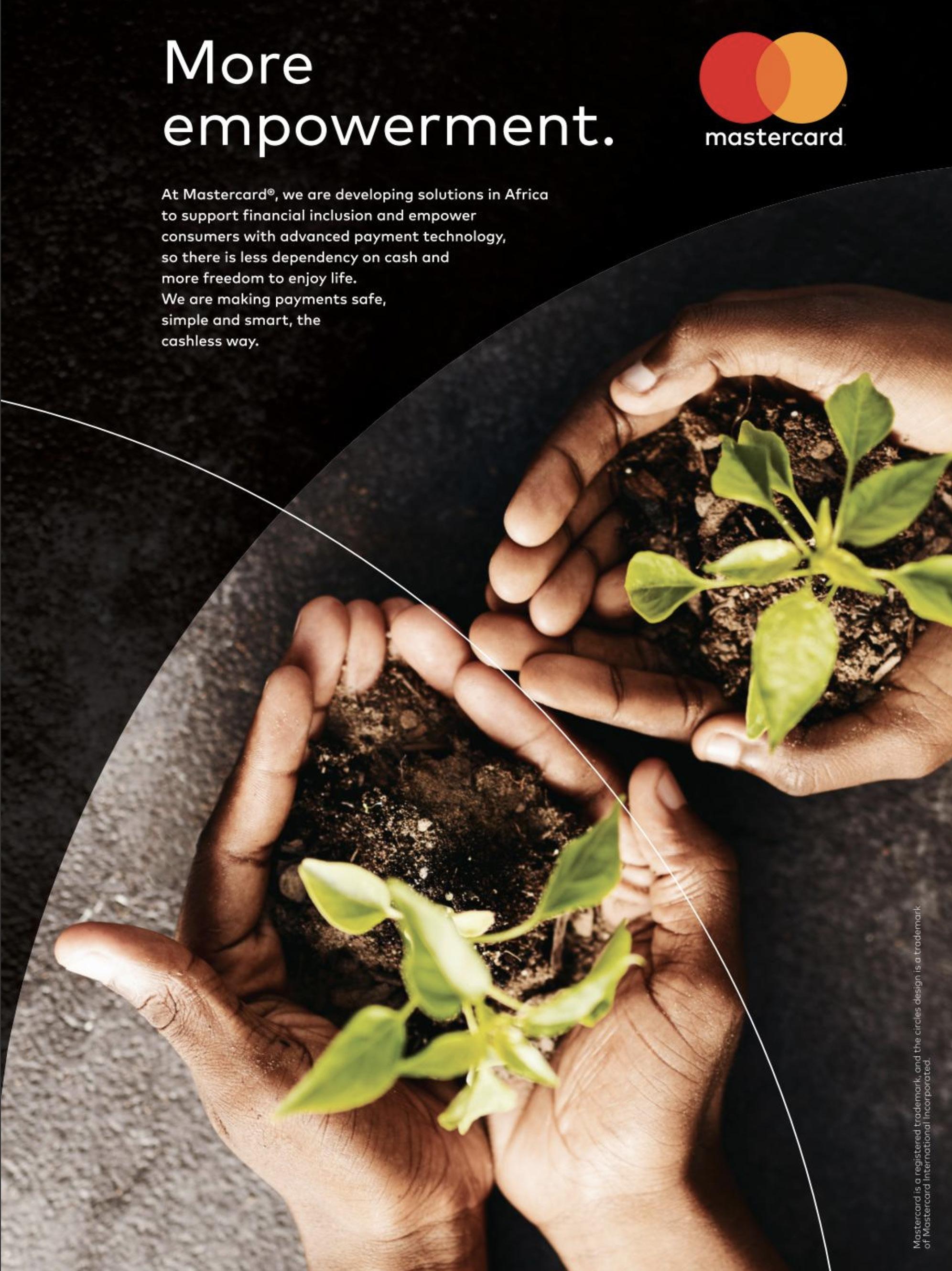HOW FINTECH COMPANIES CAN ACHIEVE 100% UPTIME & RELIABILITY
IMPLEMENTING OPEN BANKING IN AFRICA CHALLENGES & OPPORTUNITIES
BLOCKCHAIN IN AFRICA: 2023 A CATALYST FOR FINANCIAL INNOVATION AND GROWTH

HOW FINTECH COMPANIES CAN ACHIEVE 100% UPTIME & RELIABILITY
IMPLEMENTING OPEN BANKING IN AFRICA CHALLENGES & OPPORTUNITIES
BLOCKCHAIN IN AFRICA: 2023 A CATALYST FOR FINANCIAL INNOVATION AND GROWTH

HOW ARTIFICIAL INTELLIGENCE IS RESHAPING THE AFRICAN BANKING LANDSCAPE

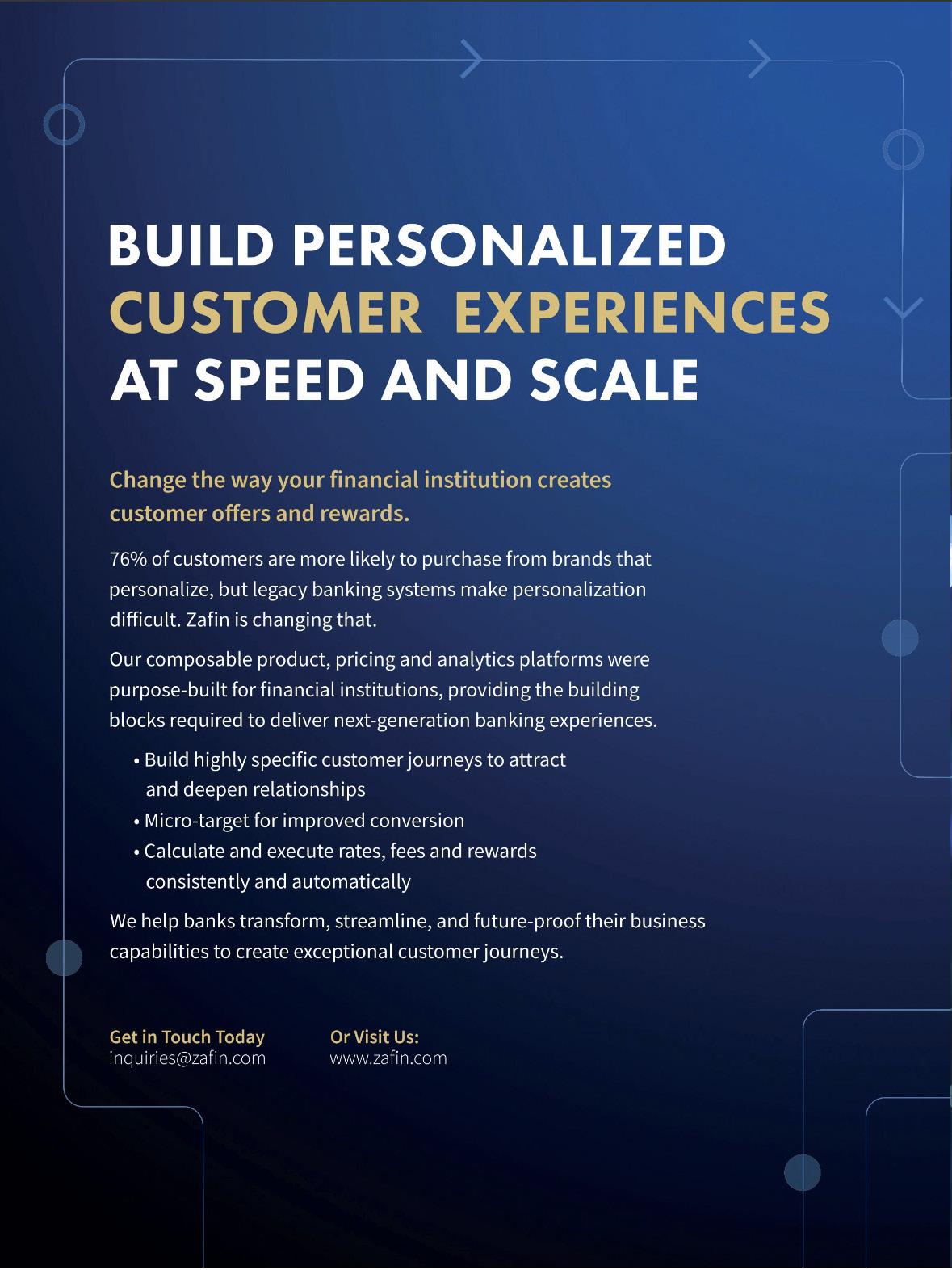





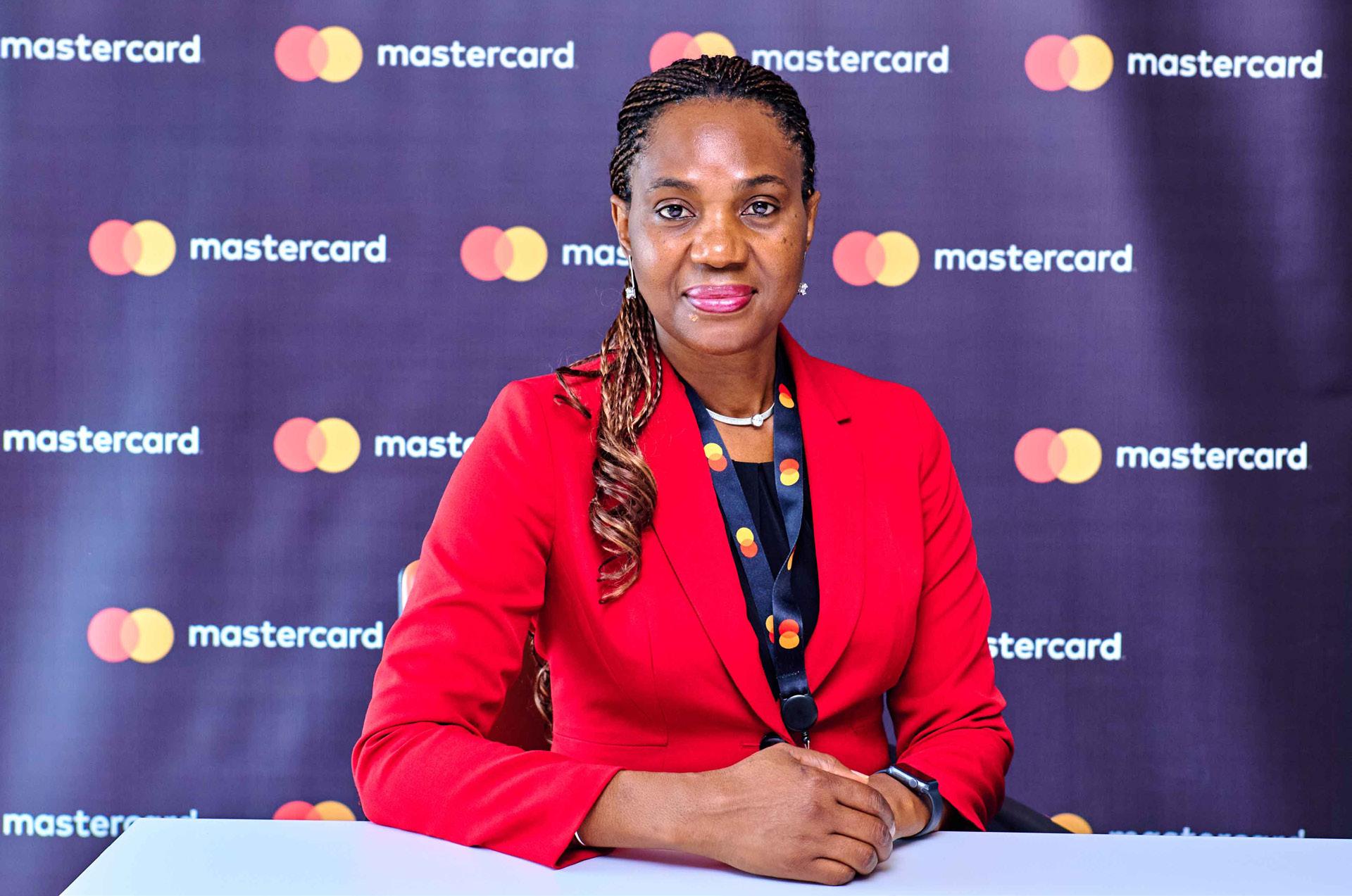





Welcome to the Spring Edition of Digital Banker Africa magazine, dedicated to exploring the dynamic world of digital banking in Africa. We are thrilled to present an extraordinary lineup of esteemed writers, industry experts, and thought leaders who will share their insights and expertise on various topics shaping the financial landscape of the continent. In this edition, we delve into the transformative power of blockchain technology and its impact on Africa’s financial sector. We will unveil the latest trends, success stories, and potential applications of blockchain, highlighting how it is revolutionising transparency, security, and efficiency in financial transactions.
Financial inclusion takes centre stage as we explore initiatives that are bridging the gap and empowering underserved communities across Africa. Our articles will shed light on innovative strategies, technologies, and partnerships that are driving greater access to financial services, creating economic opportunities, and empowering individuals and businesses to thrive. Additionally, we will delve into the world of paytech, examining the advancements in digital payment technologies that are transforming the
way individuals and businesses transact. From mobile payment solutions to digital wallets and contactless payments, our articles will explore the latest innovations and their role in driving financial inclusion and economic growth. Throughout this edition, we will cover a wide range of subjects, including regulatory frameworks, data privacy, cybersecurity, artificial intelligence, and much more. Our goal is to provide you with a comprehensive and insightful look into the multifaceted world of digital banking in Africa. We invite you to join us on this captivating journey as we uncover the untapped potential, remarkable achievements, and groundbreaking innovations within Africa’s vibrant fintech landscape. Prepare to be inspired, informed, and engaged by the diverse perspectives and in-depth analysis presented by our esteemed contributors.
Thank you for joining us in celebrating the ingenuity and transformative power of digital banking in Africa. Together, let’s explore the possibilities, spark conversations, and shape the future of finance on the continent.
Welcome to the Spring Edition!

AUSTIN OKERE Founder
CWG Plc and the Ausso Leadership Academy
AZUKA MORDI
Digital Banking SME, Financial Services Advisory
PwC Ireland
DARE AYANWALE
Payment Technical Analyst
Paysafe
EBEHIJIE MOMOH
Country Manager and Area Business Head, West Africa
Mastercard
EDEM GLYMIN CEO
Global Secure Solutions
KHALED ELGOGHEL
Fintech and digital transformation expert
NURU MUGAMBI Advisor
Sustainable Banking & Finance Network
RENEN WATERMEYER Founder & CEO
SASA Solutions
SOLOMON AMADI
Vice President of Processing Infrastructure Moniepoint Inc
Editor: Anthony Bempong
Executive Editor: Noel Morrison
Deputy Editor: Henry Scott
Art Director: Pritesh Patel
Layout Designer
Abdhesh Kumar Jha
Chief Sub:
Kwabena Mensah Bonsu
Head of Online Development: Lee-Anne Doughlin
Online Development: Gerald Hutchfull, Paulette Davidson
Subscription Manager: Stephen Rock
Marketing Manager: Siobhan Copland
Marketing Assistant
Jason Hall, Nikki Jadine
Circulation manager:
Nathan Asare
Head of Sales:
Michael Scott
Production Editor: Rebecca Mcglynn
Business Development: James Walters, Lloyd Quansah, Paul Da
Associate Producer: Dean Kirby
Head of Accounts: Wayne Sykes
Publisher:
Percival Marshall ISSN 2752-4485
www.digitalbankerafrica.com

Images by www.istock.com
All information contained in this publication has been obtained from sources the proprietors believe to be correct, however no legal liability can be accepted for any errors. No part of this publication can be reproduced without prior consent from the publisher.
Africa’s fintech industry has experienced remarkable growth and investment in recent years, positioning it as a leading force in global financial technology innovation. With large financing rounds, the emergence of unicorn startups, and increasing customer traction, the momentum of Africa’s fintech sector shows no signs of slowing down. In this article, we delve into the key findings of a report by Financial Technology (FT) Partners, highlighting the growth of fintech in Africa and the exciting prospects it holds for the future.


Despite a temporary dip in global fintech funding trends, Africa witnessed a record-breaking year in 2022 for financing transactions. With 135 announced deals, representing a 17% increase from the previous year, investors continue to display strong confidence in the potential of African fintech. This surge in
funding showcases the enthusiasm for supporting young and promising startups in the region.
Analysing funding trends, the report identifies the payment and banking/lending tech sub sectors as the frontrunners in securing funding since 2017. These two categories have amassed a total of US$2 billion and US$1.6 billion,
respectively. Furthermore, they account for over 50% of fintech financing transactions, with 157 deals in payments and 91 deals in banking/lending tech. This emphasis on payment solutions and inclusive banking reflects the industry’s focus on addressing the needs of consumers and businesses across Africa.
Several remarkable fintech deals took place in 2022, demonstrating the diversity and potential of African fintech companies. Companies such as Interswitch, MFS Africa, Wasoko, and Flutterwave secured significant funding rounds, ranging from US$100 million to US$250 million. These deals highlight the increasing recognition and support that African fintech startups are receiving, both domestically and internationally.
Additionally, the year witnessed a rise in fintech exits through mergers and acquisitions. Notable transactions included the acquisition of Nigeria’s payment orchestration startup, Orchestrate, by fintech infrastructure provider Bloc, as well as Egypt’s open banking startup, Underlie, being acquired by UAE-based Fintech Galaxy. These acquisitions underscore the maturing nature of the African fintech sector and its attractiveness to investors and acquirers.

The adoption of fintech solutions in Africa has been steadily increasing, with a notable acceleration during the COVID-19 pandemic. Fintech has provided convenient and secure alternatives to cash transactions, addressing the needs of both consumers and businesses. Markets such as South Africa, Nigeria, Egypt, and Kenya have emerged as key players, driven by factors such as their sophisticated financial ecosystems, consumer-focused solutions, and mobile payment innovations.
Looking ahead, the report predicts that the momentum in African fintech will continue to build. Favourable market factors, including a young and techsavvy population, high mobile penetration, and increasing government support for financial inclusion and digitization, will further drive the industry’s growth. With approximately 90% of payments still conducted in cash and a significant portion of the population remaining unbanked or underbanked, Africa represents one of the most promising long-term growth opportunities for fintech globally.
Africa’s fintech sector is on an upward trajectory, fueled by increased funding, innovative solutions, and growing customer adoption. The continent’s fintech
ecosystem is maturing rapidly, attracting attention and investment from both local and international players. With supportive regulatory environments, a large unbanked population, and a strong demand for digital financial services, Africa is poised to unlock its full potential and become a global leader in fintech innovation. As we move forward, the future of fintech in Africa looks promising, with projected revenues expected to reach up to US$30 billion by 2025, marking an eight-fold increase from the current value.
To capitalise on this tremendous opportunity, the report emphasises the need for continuous collaboration and knowledgesharing. Corporate education about the benefits of blockchain technology, as highlighted in the previous section, remains essential. Bridging the knowledge gap and raising awareness among C-level executives will unlock further growth potential and foster a supportive ecosystem for fintech innovation.
Furthermore, governments and regulatory bodies play a crucial role in facilitating the growth of fintech in Africa. By implementing favourable regulations, promoting financial inclusion, and providing incentives for innovation, policymakers can create an environment that encourages investment and supports the development of cutting-edge fintech solutions.
The rise of fintech in Africa is not only transforming the financial landscape but also driving economic growth and empowering individuals and businesses.
As digital banking and fintech solutions become increasingly accessible and integrated into everyday life, they have the power to enhance financial inclusion, facilitate cross-border transactions, and drive economic development across the continent.
As a whole, Africa’s fintech industry has experienced significant growth and investment in recent years, positioning the continent as a key player in the global fintech landscape. With recordbreaking funding rounds, the emergence of unicorn startups, and a strong focus on payment solutions and inclusive banking, Africa’s fintech sector is poised for further expansion. By leveraging its favourable market factors, such as a young population, high mobile penetration, and supportive regulatory environments, Africa has the potential to become a global fintech leader. With continued collaboration, knowledge-sharing, and government support, the future of fintech in Africa holds tremendous opportunities for financial inclusion, economic growth, and technological innovation.

Effective leadership plays a critical role in shaping the success of any society or organisation. The quality of leaders often sets companies and nations apart. When leaders are visionary and bold, they can motivate teams to perform at their best. I share the sentiments of John Maxwell, a respected American author, who famously declared that “everything rises and falls on leadership.”


Visionary and collaborative leadership is essential for addressing the major global challenges of today. Visionary leaders have the ability to see further and more clearly than others, often anticipating what lies ahead. However, solving complex societal challenges requires collaboration and shared responsibility across all sectors. Collaborative efforts are often more effective than individual ones, as they enable a greater diversity of ideas to flourish and prevent any one individual or entity from shouldering the burden alone.
In today’s complex and connected world, leaders need a diverse skill set to be successful. The emergence of new technologies, such as Artificial Intelligence and Large Language Models like ChatGPT, introduces new challenges that require leaders to constantly learn, unlearn, and relearn to adapt themselves and their organisations. By embracing innovation and creativity, leaders can move beyond current realities and unlock new possibilities, iteratively creating new and improved realities.
In collaboration with AACSB International, the global accreditation body representing over 950 accredited business schools, we conducted an inquiry into the leadership competencies necessary for driving societal change and sustainability, taking into account not just profits, but also people and the planet. It is crucial that we consider what types of growth we need and what we can no longer afford.
Depolarization - the ability to reject binary thinking, embrace complexity, and explore alternative perspectives. It requires selfawareness, an open mind, and a non-judgmental space for meaningful dialogue.
Paradox - the willingness to embrace uncertainty and acknowledge the interdependence of opposing forces. It involves operating with a curious and inquisitive mindset, recognizing our own limitations, and being honest with ourselves and others.
Compassion - the capacity to empathise and understand different cultural backgrounds, personal experiences, and other nuances - necessitates maintaining a broad perspective, avoiding confirmation bias, and striving to understand as well as to be understood. These competencies are crucial for future leaders and should be integrated into business
Austin Okere Founder, CWG Plc and the Ausso Leadership Academyschool curricula to be taught to students.
A key ingredient of leadership is effective communication. Communication is always a twoway track, with the key part being generative listening, where one listens with the anticipation of learning something new, devoid of all ego. In order to fully listen, we have to quiet the voices of judgement, cynicism, and fear, all of which can thwart any chance of getting to the root of the matter. When we open our hearts and engage in empathic listening, we can truly step out of ourselves and know that truth is more conditional and experiential than our lone ego can fathom. Sometimes leaders tend to be so arrogant and selfconceited that they are totally confident in a totally incorrect view. Our need to be right can trounce our need to find out what is true. Truth is the essential foundation for producing good outcomes.
Drawing on my extensive experience as a leadership consultant and Entrepreneur-inResidence at the Columbia Business School, I have identified a critical factor that distinguishes leaders: their attitude towards delivery and accountability. This attitude is profoundly influenced by whether they lead from a place of courage or fear.


To help clarify this relationship, I have developed Austin’s model for analysing leadership attitudes. This model depicts the contrasting attitudes towards delivery and
accountability of bold, courageous leadership versus fear-based leadership. See the schematic below for a visual representation of this model.
a) Fear-based leaders have a tendency to make excuses for failure, seeking reasons outside of themselves when things go wrong. They often hold onto commendations for success but avoid taking accountability for failures. Their language is often punctuated by the phrase “because of,” which can discourage learning and promote a culture of excuses, resulting in subpar performance.
b) Conversely, courageous leaders prioritise action and performance when it comes to delivery. Instead of seeking excuses, they go above and beyond to achieve their goals. Their language is often punctuated by “in spite of,” and they serve as examples to their teams by delivering exceptional performance.
a) Fear-based leaders tend to avoid accountability by blaming others for failure. They do not take responsibility for their own actions and instead look for external factors to blame. They may even scapegoat a team member to avoid taking the blame themselves, which creates a culture of passing the buck and prevents the team from learning and improving.

b) In contrast, courageous leaders take full responsibility for their actions, even if they delegate tasks to team members. They recognize that accountability cannot be delegated and take an internal approach to fault-finding. By modelling this attitude, they encourage their team to take ownership of their work and
learn from mistakes, leading to continuous improvement in performance.
Leaders who exhibit courage and compassion inspire trust and high performance not only within their organisations but also in society at large. Fear-based leaders are often more afraid of their anxieties and concerns about what others might think of them, rather than actual adversities. As leaders, it is crucial to be authentic, focusing on accomplishments over seeking affirmation, significance over security, and long-term sustainability over immediate victories. By doing so, we can lead our organisations and society towards a better future.
Austin Okere is a thought leader and business mentor. Currently, an Entrepreneur-in-Residence at
Africa Centre in Rwanda. Austin was appointed to the Advisory Boards of the AACSB International and the
founded, has been recognized as a ‘Global Growth Company’ by the World Economic Forum and

Innovations in the digital information technology industry have taken a swift direction. These innovations are opening up opportunities geared towards improving economies and alleviating various hurdles encountered by digital consumers, and the industry is headed for victory. In recent times, we see a rise in the innovation of tools that are artificially intelligent (AIcontrolled), mostly developed by organisations and industry experts, and these tools are contributing to noticeable improvements in
services provided by different sectors of the economy. Above all, the reigning innovation in the financial technology space is called Open Banking, which has created a lot of benefits for business drivers and their customers.
Open Banking is an industry change that is opening up access to financial data, enabling innovation, and increasing competition in the financial services industry. A common phrase used by financial system experts is, “We are still scratching the surface of the evolution in Africa,” suggesting that

the innovations in the payment system have only just begun. An example of innovation is the advent of the Open Banking shift; another huge service being used in the financial industry.
While the phrase “Open Banking” is perceived by many as a solution solely for banking needs, it is more than that. Outside the financial industry, Open Banking can be seen as a platform serving multiple industries geared towards providing excellent customer service. It would benefit leaders who aim to achieve 100% customer
retention to practise and apply Open Banking ideas, rich data into business. It is no longer news that Open Banking is the key to exposing data-driven experiences for higher income and customer satisfaction.
The banking industry is known to have rich and complete data on customers, from when they are on boarded till when they start transacting. The availability of this data gave rise to Open Banking, which I also refer to as data-as-aservice.
Stepping outside the financial industry, user experience must be considered when making different API calls. One of the disadvantages of applying Open Banking is the absence of seamless customer experience (friction). Open Banking API needs to be optimised for mobile users to reduce friction during the customer journey process.
For instance, if you have made a payment or viewed your balance with your loan company, chances are you have used Open Banking services. You may have noticed that you have to exit the initial app to be able to authenticate yourself with your banking or insurance provider, as the case may be. This process might involve redirection to a web browser for the authentication process, and thus create browser loading time. Every customer today is either impatient, not educated, or not IT savvy; they desire to complete the transaction within seconds and move on to other
Dare Ayanwale Paysafe Payment Technical Analyst
things. Product managers ought to ensure the customer transaction journey is enhanced to be frictionless. Having superior user experience by bypassing certain steps in the user journey, easier integration, and faster time to the market (this means a lot to the sales guys who are always on the road to acquire more customers), operational issues will be reduced (No more timeout errors).
What is Open Banking to a homeowner or property management company? Most homeowners prefer to carry out the tenant selection process themselves. In contrast, others prefer to ease the stress by employing a property management company. In either case, the process of getting to know the right and financially enabled tenant is the job to be done.
Nobody aims to rent an apartment out and then face issues in getting the monthly house rent. The innovation of Open Banking API has automated this process. It can transform the tenancy selection process by providing property managers and homeowners with accurate financial status of prospective tenants based on income, existing rental payment, and other expenses (with consent agreement in place). This way, Open Banking has reduced the stress undertaken by homeowners
or letting agents and tenants in the paperwork process.
As we experience a spike in the adoption of financial inclusion in most African countries, the application of Open Banking will benefit the super-agents and their customers. With API integrations, super-agents can offer loyalty programs without issuing cards or giving stickers. With Open Banking, they can operate a seamless loyalty program that identifies consumers’ transactions at the agent shop, which will help them retain customers. This process can also help deep dive into what services customers use at their location (online or in-store). With this rich data and leveraging on consumer spending patterns using APIs embedded in their e-commerce website, super-agents can generate relevant offers to their clients at different times of the year.
The application of the Open Banking principle benefits several industries outside financial services, for example, the Telecommunication Industry, Utility companies, and the health industry, to mention a few. Leaders in the digital technology sector should strongly consider developing trends and opportunities created by the Open Banking shift and data. This shift has helped and will continue to help business leaders in driving their businesses while they put their customers into consideration.
Over time, banks have tried to offer several products and services to small and medium-sized businesses (SMEs) but struggled to tailor products that meet their specific needs and to find a way to crack the SMEs segment, despite SMEs being an essential part of any economic growth.
Fintech has started to recognize the needs of SMEs and can fill the gap by offering innovative solutions that meet the needs of these small businesses. According to the World Bank, “SMEs represent about 90% of businesses and more than

50% of employment worldwide. Formal SMEs contribute up to 40% of national income (GDP) in emerging economies”. There are many opportunities, challenges, and benefits that many Fintechs will face when targeting innovative solutions for SMEs. The region’s trend of Fintech ventures has focused on consumers, but now is the time to focus on SMEs, with services such as lending, invoice financing, supply chain financing, and trade financing. Combining customer service, technology, and tailored financial products will
ensure the new wave of Fintech growth is flourishing. Fintech must have a good use case to meet the needs and to be crafted with SMEs in mind and provide them with a solution to the challenges SMEs face, whether due to limited resources or knowledge of the regulation within each country.
Fintech can be essential in impacting and serving SMEs, as the sector is ready for the next wave of growth in the coming years. However, with this growth, Fintech companies must commit to providing secure and reliable services to gain trust. The next wave of Fintech solutions and services to SMEs will focus on the following:
1 Lending: Fintech companies can provide SMEs with alternative lending solutions, such as peer-to-peer lending and online loans, with different tenures tailored to each business sector.
2 Invoice financing: Fintech can tailor solutions to enable SMEs with the financing capabilities and tools to finance their unpaid invoices, allowing them to access the cash tied up in their accounts receivable.
3 Supply chain financing: Alternative financing options and tools to manage cash flow and get additional benefits from suppliers by paying one time.
4 Trade financing: Alternative financing options for international trade, such as letters of credit and export financing.
Significant changes that Fintech will bring to provide a unique selling proposition in serving the SMEs:
1 Faster access to funding: SMEs will get speedier access to funding than traditional banks.
2 Alternative forms of lending: These will be tailored to SMEs individual needs.
3 Lower costs: Providing lower costs of services and enabling the digital transformation benefits versus traditional banks.
4 Increased efficiency: Fintech will provide different digital tools and platforms that increase efficiency and automate processes.
5 Improved data analysis: SMEs will have access to data analysis tools and insights to help them make betterinformed business decisions, which have been the focus of traditional banks.
Many government initiatives focus on providing SMEs with access to funding and other resources to help them grow and enable SMEs with digital transformation. Enhancing the technology provided in SMEs will create a new opportunity for Fintech due to its limited resources and investment in digital transformation, providing an opportunity for Fintech companies to offer digital solutions. An additional option for Fintech companies is that the government focuses on SME growth, which can assist in providing subsidised funding for SMEs if Fintech successfully delivers tailored solutions. Additionally, there is a
large and underserved market for alternative financial solutions among SMEs. The government has different programs to assist in growing and developing SMEs, which could increase the country’s overall gross domestic product (GDP).
There are several challenges that fintech companies need to tackle to serve SMEs, but the first one will be convincing SMEs to trust the new financial solutions and education, especially from untested fintech companies. To overcome this challenge, fintech companies need to build trust by providing precise product education and transparent information about their products and services. An additional challenge will be the limited financial data produced by SMEs, which can be a significant challenge for fintech companies. With access to limited data produced by SMEs, fintech may need help to assess the creditworthiness of SMEs, which will limit the types of products. Fintech companies must closely work with SMEs to collect and simplify data by developing digital tools that can help them assess credit risk. Another challenge that fintech needs to tackle is the regulatory environment, which requires Know Your Customer (KYC) and Anti-Money Laundering (AML). SMEs may need good bookkeeping to comply with these regulations, which can make it challenging to fulfil their KYC and AML obligations. Fintech needs to work with SMEs to develop digital tools for data availability and collection.
In conclusion, fintech can drive SME growth and is well-positioned to drive the next wave of growth by helping SMEs with financial services. Combining technology and finance, fintech can offer quicker, more accessible, tailored solutions and
secure service access. Fintech services will significantly impact SMEs by providing them with several financial products and services previously only available to larger companies. The tailored digital lending platforms will enable SMEs to access funding easily, manage their finances, and grow their business by reaching new customers. Additionally, fintech services can help SMEs to increase efficiency by automating processes and accelerating digital transformation. Fintech must continue to address data collection, security, and regulation challenges when providing services to SMEs to successfully underserved SME markets. Fintech will be well-placed to play a vital role in the growth and success of SMEs, especially with the increasing adoption of digital technologies and the need for more accessible financial services. Fintech still has a long journey, and it will continue to innovate to meet the SMEs’ requirements and the market, making it an essential partner for SMEs’ success in the future.

Fintech and digital transformation expert
Khaled Elgoghel is a seasoned professional specialising in closing the gap between technology, finance, and business needs. He is an expert in formulating a strategic plan to facilitate business growth, steer strategy in the digital age, and revolutionise the status quo. He has over 22 years of experience combining the corporate role with entrepreneurship in driving positive change and helping organisations thrive in today’s rapidly evolving business landscape.

The Fintech business has been making massive impacts in recent times in the African ecosystem, and this has contributed to the overall use of technology tools for transaction processing. However, there has been an increased surge in financial transactions over the years that has now seen a lot of consumers gradually shift their transacting patterns from traditional in-branch banking to a more digital approach. Whilst several entrepreneurs have been able to hop on the fintech transaction digitization bandwagon, the ability to scale and service customers without major downtimes has been a huge concern over the years.
Companies tend to go with the 300 Spartans approach when starting off a company and eventually go live and start scaling with this same amount of guys. Unfortunately, this is not a three-day journey nor are you fighting 70,000 enemies that die only once. If a transaction fails today, it is re-tried almost immediately. Getting the right amount of people with the right skill set and mentality cannot be overemphasised as these individuals are the pillars of your organisation and the experts that drive the bazookas and armour tanks that you use to service your customers.
The Spartans had a systematic way of approaching their battles. They would have performed pre-battle rituals and developed fiercelooking, well-trained external
appearances towards their battle. Many tech companies today lack the right process from the ideation stage to execution, and there are two parts to it:
Engineering: Take an engineering team in a Gen-Z fintech startup world today, we see the senior engineer playing the role of an Enterprise Architect, and the Product Manager playing the role of a Quality Assurance Engineer. Automatically, this flaws the process of building as there are more short-sighted activities than the overall grand scheme goal of the product. What we then have is a product that has not gone through a rigorous development cycle that can stand the test of time. There are several standard engineering issues that a product team should think about when building, these issues range from application scaling, database scaling, API optimizations, default
configurations, unoptimized database tables, and a host of others. With the right engineering process, several aspects of the engineering issues will be addressed and tackled even before go-live.
Issue Resolution: The question I typically ask companies or product teams when they go through issue resolution is, did we learn from that? Or did we just fix it and move on? I believe this is a pretty obvious aspect of process development. They say, “what doesn’t kill you makes you stronger,” but if you look back, did the resolution of that issue make you stronger? Or did it just create another grey area in your system that people will forget about over time? As an organisation, when issues come, you should typically find a solution at the moment to service your customers and create an incident report as well as a newly implemented process that will prevent that issue from occurring again in the future.
The process could be a new engineering task or product feature, or simply a step-by-step guide on dos and don’ts that people should follow.
This is one aspect of achieving 100% uptime that is largely overlooked. Companies don’t just simply invest in monitoring. I mean, why pay someone to just look at a bunch of dashboards
and screens for the whole day and not do anything? That’s simply “unrealistic” for some companies, and it only makes sense for big companies and organisations to have a monitoring team. However, what these companies fail to understand is that monitoring is one of the most important parts of a product. Now, some might argue that they have monitoring, but in reality, what they have are “problem announcers.” Monitoring is not being reactive to issues, it’s about being proactive and being able to sense when there’s a potential issue that could occur. This can be achieved by a combination of tools tailored to your products and people who are well-trained with the right skill set. A few tips on things to monitor include:
Database Monitoring: Just look out for slow and inefficient queries, DB table size growth, and resource utilisation.
API Monitoring: Look out for API calls that take the most time in a microservice and optimise them. There are several tools to achieve this, e.g., New Relic, DotcomMonitor, Checkly, Uptrends, etc.
Third-Party Systems Monitoring: This is also related to API monitoring, only that this time you might not be able to install custom tools for this. However, you can build out metrics and checks into your application, such as success rate and average response time tracking for the providers you are integrated with.
Monitoring: Sometimes, the underlying infrastructure can be a problem, even after several optimizations of other components, you might still see the server struggling. Thankfully, we have tons of gigabytes in the modern world that can be purchased from several sources to help the application from struggling with resource utilisation.
Network Monitoring: Your VPN server can be the culprit, or even the firewall or router. They could be dropping packets or even have lost connection to the other entity’s server. Monitoring this by configuring alerts for idle tunnels, increased load, or packet drops can help the team become proactive.
There are three main parts of distributed processing:
Applications: There’s a reason the micro-service architecture was invented. Please use it! Having one monolith doesn’t help your cause as an organisation. In addition, know when to scale your applications. Tools like Kubernetes and load balancers have been made available to help with the auto-scaling of applications. This helps distribute the load across several instances of a microservice.
Databases: Know when to scale horizontally and vertically! Aside from backing up the database tables and adding more resources,
sometimes it’s best to just horizontally scale the DB simply to separate concerns and reduce the load on one DB instance. It’s also similar to the microservice approach.
Alternative Routes: Don’t put all your eggs in one basket if you want to scale! The people you’re connected to or relying on might not be willing or ready to grow as fast as you want to. Get several ACTIVE routes for a single responsibility. I repeat, ACTIVE, not passive. Use them actively and spread the load across them all. This will help you understand the strengths and weaknesses of your providers over time. Don’t just use one main partner and wait for them to fail before you move over to the next person, use them all at the same time. This way you don’t create a bottleneck out of your providers.
VPNs. Have several VPN providers, don’t just assume Google can never go down, or Azure can never go down; they are also companies like you.
Pen-testing your systems regularly cannot be overemphasised. Not just before go-live, but even after golive. There have been several cases of hackers performing D-DOS attacks on systems that eventually lead to downtimes. Carrying out whitehat testing helps identify areas of improvement in your system’s security and ways to mitigate them.
You cannot hire all the experts in this world, but you can train individuals to become experts!
• Carry out routine cybersecurity training to help build reliable and secure systems.
Achieving 100% uptime and reliability is not stumbled upon but requires a deliberate set of actions and consistent planning to reach the said goal. With the 7 perfect tips above, I believe you should achieve 100% uptime in little or no time, having the right set of people, processes, and tools.
Solomon Amadi Vice President of Processing Infrastructure Organisation: Moniepoint Inc

Training your employees is a very crucial aspect of achieving reliability. The ability to learn new technologies or even learn more about existing technologies currently being used in an organisation helps the employee deliver even more. Don’t just rely on the skill you used to hire the employee as it might have been obsolete in another year or two. A few tips:
TRAINING: Pluralsight, Coursera, Udemy, and a couple of them.
This is similar to Alternative Routes earlier stated, however, instead of a manual failover on one provider, you build monitoring tools into your application to help detect when providers are performing below their normal expectations and automatically switch to the next most optimal provider. This will help eliminate potential downtimes from a provider, and the time to manually change a configuration from one to another will be completely eliminated, thus presenting a much more reliable system to your customers. The same can be done on the network layer connections via
• Invest in online training courses for your employees e.g
• Carry out physical training for your employees by either sending them for training with organisations whose tools you use or inviting these experts to train your employees internally.
Solomon Amadi is the Vice President of Processing Infrastructure at TeamApt Limited, Nigeria’s leading financial inclusion digital technology provider with almost a billion dollar valuation. He has 10+ years of experience in software engineering and His expertise spans Business strategy, transaction switching, Engineering, Product Management and Software architecture.


Welcome to our exclusive interview with Ebehijie Momoh, the Country Manager and Area Business Head, West Africa at Mastercard. In this interview, we will be exploring the critical topic of empowering small businesses to access financial and digital payments, with a particular focus on women and youth entrepreneurship in Nigeria. With millions of small businesses driving the country’s economy, it is vital that we find ways to overcome the barriers that limit their access to financial services and digital payment solutions. Mrs. Momoh is an expert in the field of financial inclusion, innovation, and technology, and has been working to develop innovative solutions to help small businesses in Nigeria thrive. In this interview, she will share her insights on the challenges faced by small businesses, how digital banking institutions can collaborate with stakeholders to improve access to financial services and digital payment solutions, and the impact of increased access on the Nigerian economy. We are excited to dive into this discussion with Mrs. Momoh and to learn more about how we can empower small businesses to achieve their full potential.
Can you tell us more about the challenges faced by small businesses, especially women and youth entrepreneurs, in accessing financial services and digital payment solutions in Nigeria?
Small enterprises, particularly those owned by women and young entrepreneurs, encounter various obstacles when seeking financial services and digital payment solutions in Nigeria. Small businesses play a significant role in the Nigerian economy, with their successes and setbacks having a ripple effect that impacts countless lives and local communities in lasting ways.
The high youth unmployment rate in the country often leaves starting a small business as the only viable means of creating a livelihood. The World Bank has estimated that SMEs are accountable for 77% of all jobs in Africa and contribute up to half of GDP in some countries, yet their access to finance is among the lowest in the world. Arising from this, data from IMF reflects that 47 African nations found that women are more prone to opt-out of loan offers due to low perceived creditworthiness.
Access to credit, high use of cash, infrastructure limitations, and power supply interruptions are some of the challenges faced by small businesses in Nigeria. On the one hand, brickand-mortar shop owners are quickly adjusting their companies to online
platforms to save costs and maintain operations. On the other hand, many are trying to learn about e-commerce with limited resources, while others are figuring out the logistics and operations to get their products in the hands of consumers.
COVID-19 has also resulted in shifts in consumer behaviour, and small merchants will need to adjust to them accordingly to stay afloat. There has been a move from in-person to online payments, and from cash to contactless, amidst social distancing recommendations following the pandemic.
Cybercrime has been on the rise, and there are pressures on cash flow.
Finally, small businesses are making important decisions and changes to their daily operations, and are, therefore, in great need of data, analytics, and insights to help them navigate this uncertainty.
What innovative solutions has Mastercard developed to help small businesses, particularly women and youth entrepreneurs, access financial services and digital payment solutions in Nigeria?
At Mastercard, we have made a global commitment to bring 50 million micro and small businesses into the digital economy by 2025, with a direct focus on providing 25 million women entrepreneurs with solutions that can help them grow their business.
We have also created several platforms to help Nigeria’s digitalsavvy youths launch their businesses online. These include Simplify Commerce, which helps businesses get online and easily take payments across multiple channels from one single platform. Customers can create their online store, accept digital payments, manage invoices, and minimise fraud via a single portal. The technology enables merchants to reach more consumers, including those from international markets, as well as promote products via social media. There’s also the SME in a Box and Merchant Digital solutions that enable small businesses to tap into digital payments. Our existing partnerships with Airtel allow small business owners to receive a wide range of payments safely and securely and purchase from suppliers abroad and pay with our virtual payment solution.
For example, Mastercard, in partnership with Unilever, launched Jaza Duka, a digital lending platform in Kenya that aims to unlock credit for millions of small businesses. The program tracks the purchase history of small business owners who buy Unilever products and combines this data with Mastercard analytics to provide micro-credit eligibility recommendations to the Kenya Commercial Bank, who provide interest-free credit lines to eligible businesses. The program has over 20,000 participating stores in Kenya. The Jaza Duka program holds immense potential to reach millions of small business owners worldwide, particularly the 70%
Ebehijie Momoh Country Manager and Area Business Head, West Africa Mastercard
of women-owned businesses in the developing world that struggle with limited access to adequate financing. In Kenya alone, the Jaza Duka program has already disbursed over $15.7 million in credit to small business owners, with a repayment rate of over 90%. This outstanding repayment rate suggests that small business owners are utilising the credit effectively and benefiting significantly from the program. In a 2020 survey conducted by Mastercard and Unilever, the Jaza Duka program was found to have a positive impact on small businesses in Kenya, with 86% of respondents reporting an increase in sales and 69% reporting business growth. These findings clearly demonstrate that the Jaza Duka program is successfully achieving its goal of helping small business owners flourish and prosper.
Mastercard teamed up with MTN, a mobile network operator in Africa, to bring more digital services to MTN’s platform. This work adds data analytics and payment tools right on the phones of local entrepreneurs, helping them manage their businesses.
These are just a few examples of how Mastercard is driving financial and digital inclusion with the goal of creating a digital economy that works for everyone, everywhere.
Digital banking institutions are at the forefront of the financial services industry, leveraging technology to provide innovative solutions that meet the needs of their customers. They are driving financial inclusion and empowering individuals and businesses with access to affordable and convenient financial services, which is critical for economic growth and development. Digital banking institutions are transforming the financial landscape, and Mastercard is proud to partner with them to create a more inclusive and sustainable future for all.
Digital banking institutions can collaborate with the Nigerian government and other stakeholders to improve access to financial services and digital payment solutions for small businesses in Nigeria by taking the following steps:
of their services and improve access to financial services and digital payment solutions for small businesses.
Develop tailored solutions: Digital banking institutions can work with small businesses to develop tailored financial products and services that meet their unique needs. This can include loans, savings accounts, and digital payment solutions that are easy to use and accessible.
Expand their reach: Digital banking institutions can expand their reach by collaborating with other stakeholders such as mobile network operators, fintech companies, and trade associations to increase awareness of their services and reach more small businesses.
Provide financial education: Digital banking institutions can provide financial education and training to small businesses to help them better understand financial products and services and how to use them effectively.
Financial education plays a critical role in promoting financial inclusion and empowering small businesses in Nigeria. With the rise of digital payment solutions, it is important that small businesses are equipped with the knowledge and skills needed to effectively manage their finances and take advantage of these innovative technologies. Digital banking institutions can support financial education efforts in several ways, including:
Partnering with local organisations: Digital banking institutions can partner with local organisations such as trade associations, non-profits, and community-based organisations to deliver financial education programs to small businesses.
Partner
government agencies: Digital banking institutions can partner with regulatory agencies such as the Central Bank of Nigeria (CBN) and the Small and Medium Enterprises Development Agency of Nigeria (SMEDAN) to increase awareness
By collaborating with the government and other stakeholders, digital banking institutions can play a critical role in improving access to financial services and digital payment solutions for small businesses in Nigeria, which can help drive economic growth and improve the lives of millions of Nigerians.
Developing educational resources: Digital banking institutions can develop educational resources such as online courses, webinars, and training materials to help small businesses learn about financial products and services and how to use them effectively.
Offering financial coaching and support: Digital banking institutions can offer financial coaching and support to small businesses to help them navigate financial challenges and make the most of digital payment solutions.
Promoting financial literacy: Digital banking institutions can promote financial literacy through marketing and advertising campaigns that highlight the benefits of using digital payment solutions.
Mastercard is committed to supporting financial education initiatives in Nigeria through partnerships with government agencies, non-profits, and other stakeholders. We believe that by providing small businesses with access to financial education, we can help them better understand financial products and services and make informed decisions about managing their finances.
How can technology, such as artificial intelligence, be leveraged to create more inclusive financial services and digital payment solutions for small businesses in Nigeria?
Technology plays a critical role in creating more inclusive financial services and digital payment solutions for small businesses in Nigeria. Artificial intelligence, for instance, has the potential to revolutionise the way small
businesses access financial services and make digital payments.
With Artificial Intelligence, small businesses can better understand their customers and their purchasing behaviour. By analysing large volumes of data, Artificial Intelligence can provide insights into customer preferences, allowing small businesses to tailor their products and services to meet the needs of their customers. AI-powered fraud detection and prevention tools can also help small businesses to minimise the risk of fraudulent transactions.
In addition to Artificial Intelligence Mastercard is also leveraging other technologies to create more inclusive financial services and digital payment solutions for small businesses in Nigeria. For example, the payment link solution enables small businesses to accept digital payments from customers, even in areas without access to traditional banking services. Our digital identity solutions also help small businesses to verify the identities of their customers, reducing the risk of fraud and improving the customer experience..
What impact do you think increased access to financial services and digital payment solutions will have on the Nigerian economy, and how will it benefit small businesses and entrepreneurs?
Increased access to financial services and digital payment solutions is projected to have a significant impact on the Nigerian economy, particularly in terms of promoting financial inclusion and economic growth. As a leading global payments company, Mastercard is committed to leveraging technology and innovation to expand access to financial services and promote economic development in Nigeria and across the African continent.
By providing more Nigerians with access to digital payment solutions, Mastercard aims to help small businesses and entrepreneurs grow and thrive. Digital payment solutions, such as mobile wallets and payment cards, offer a more convenient, secure, and efficient way to transact, which can help small businesses save time and money. Additionally, by facilitating access to credit, these solutions can help entrepreneurs and small business owners grow their operations and create jobs, thereby contributing to economic growth.
Another key benefit of increased access to digital payment solutions is that it can help promote financial inclusion. By providing more people with access to basic financial services, such as collaborating with partner financial institutions to provide bank accounts and payment cards, we can help to reduce poverty and improve overall economic wellbeing. This is especially important for small business owners and entrepreneurs, who often struggle to access financing and other financial services.
In summary, increased access to financial services and digital payment solutions has the potential to unlock economic growth and promote financial inclusion in Nigeria. By leveraging technology and innovation, Mastercard is committed to empowering small businesses and entrepreneurs with the tools they need to succeed in the digital age.
Can you share any success stories or case studies of small businesses that have benefited from Mastercard’s solutions in Nigeria, and how these solutions have helped them grow and thrive?
Mastercard is helping small businesses in Nigeria by providing them with solutions and tools to help them grow and thrive. First, we are raising awareness and driving usage of low-cost digital acceptance solutions – such as Mastercard’s payment link solution.
We are also enabling SMEs to accept digital payment safely and securely, whether through e-commerce and contactless solutions. There is the Mastercard Payment Gateway Services (MPGS), which gives small and medium-sized businesses (SMEs) the ability to accept payments through a web browser and offer consumers a simpler and safer way to transact.
Through Mastercard Start Path, we partnered with MAX, a Nigeriabased motorcycle-share company, to provide digital payment capabilities and instalments for typically unbanked riders, enabling riders to purchase motorcycles over time and, as a result, build their credit profiles.
Accion International and the Center, through its digital transformation project, are building the capacity of financial service providers (FSPs) that bank the most vulnerable individuals and micro and small businesses. Millions of micro merchants will access improved financial products and services, including credit, training, and technical assistance that reflect their needs and enable them to grow and improve their financial health.
In Nigeria, Accion Microfinance Bank (AMfB) provides loans and savings products to low-income microentrepreneurs. The Mastercard Impact Fund’s $12M grant and partnership with Accion have the goal of transforming services for 10 million people, including 4 million merchants, globally over four years.
Finally, what advice do you have for small businesses, particularly women and youth entrepreneurs, who are looking to improve their access to financial services and digital payment solutions in Nigeria?
At Mastercard, we believe small businesses, especially those owned by women and youth entrepreneurs, are the backbone of the Nigerian economy, and they play a vital role in driving economic growth and job
creation in Nigeria. We understand that accessing financial services and digital payment solutions can be challenging for small businesses, but there are steps they can take to improve their access to these essential tools.
Start with the basics: Having a bank account is the first step towards accessing financial services and digital payment solutions. Small businesses should consider opening a bank account to access the services and products that banks offer, including loans, payment cards, and online banking.
Build a strong credit history: A strong credit history is crucial for accessing financing and other financial services. Small businesses should strive to build a positive credit history by paying their bills on time, keeping their debt-to-credit ratio low, and avoiding late payments.
Use digital payment solutions: Digital payment solutions, such as mobile wallets and payment cards, offer a convenient and secure way to transact, helping small businesses save time and money. Small businesses should explore the different digital payment solutions available and choose the ones that best suit their needs.
Leverage technology: Technology is changing the way we do business, and small businesses should leverage it to improve their operations. For example, using
digital accounting software can help small businesses manage their finances more efficiently and accurately, enabling them to make better financial decisions.
Utilise Business Support Services: Many organisations in Nigeria offer support services to small businesses, including access to training, mentoring, and networking opportunities. Small businesses should seek out these resources like Mastercard’s SME-in-a-Box to improve their skills and knowledge and to make valuable business connections.
Partner with trusted providers: When selecting financial services and digital payment solutions providers, it is essential to choose a reputable and trusted partner. Small businesses should do their research and select providers with a proven record of delivering reliable and secure solutions.
At Mastercard, we are committed to helping small businesses succeed, with our range of solutions that aid entrepreneurs in growing and thriving in the digital age.
Ebehijie Momoh is the Area Business Head, West Africa at Mastercard. Based in Nigeria, Ebehijie is responsible for advancing the Mastercard brand presence in West Africa, deploying innovative payment solutions and partnering with local governments and market regulators to build a World Beyond Cash.
Ebehijie joined Mastercard from Standard Chartered Bank, where she most recently held the position of Head of Retail Banking in Ghana and prior to that, Head of Retail Banking in Nigeria. In both positions, she was responsible for the development and execution of the Retail Banking business strategy and delivering the results.

Ebehijie started her banking

Area Business Head, West Africa, Mastercard
career in Nigeria at Guaranty Trust Bank and subsequently had stints at Diamond Bank and First City Monument Bank, where she held various senior management positions including Assistant Vice President and Zonal Head, Midwest Zone, Vice President and Group Head Conglomerates and Group Head Commercial Banking, Lagos and South Region.
She holds a B.Sc. in Chemistry from the University of Lagos and an MBA from the University of Benin. In addition, she has an MBA from Bangor University, Wales, United Kingdom and is a Chartered Banker in Nigeria and Scotland. She is also an honorary member of the Chartered Institute of Bankers of Nigeria.
The Angaza Awards: Women to Watch in Banking, Finance and Investment program has announced the list of Top 10 women who are steering and shaping Africa’s financial services sector. The list was compiled following a three-month entry period which attracted dozens of professionals from 17 countries across the Continent. Launched in 2020, Angaza Awards has helped raise international awareness of the seasoned women who are shaping and influencing the financial services sector through their organizations. The Top 10 will be celebrated during the Angaza Forum which will be held in Kigali, Rwanda on August 3 and 4.
The Angaza Awards Judges Panel was chaired by Sustainable Finance and Responsible Investment in Africa Policy Expert Nuru Mugambi and constituted by Mutumboi Mundia, Director of Market Supervision & Development, Zambia Securities and Exchange Commission (SEC); Catherine Musakali, Co-Founder of Women on Boards Network Kenya; Hedwige Nuyens, Managing Director, International Banking Federation; Yawa Hansen-Quao, Founder, Leading Ladies’ Network (Ghana);
Joanita Lunkuse-Jaggwe, Expert on Financing, Office of the Prime Minister, Prime Minister’s Delivery Unit, Uganda and 2021 Angaza Awards Recipient; Luke Ombara, Director of Regulatory Affairs, Capital Markets Authority, Kenya; Esohe Denise Odaro, Head of ESG & Sustainability, PAI Partners (UK); Maxwell Pirikisi, Immediate Past President - South Africa-Nigeria Business Chamber (SA-NBC) and Director SA Chamber of Commerce and Industry (SACCI); and Jo-Ann Pöhl, Senior Advisor at Kearney (South Africa).
I commend the Judging Panel for another remarkable Top 10 list. The Angaza platform has amplified the commendable contributions African women have made to economic development, job creation and livelihoods,” said Ms. Mugambi. “Each year we see more women raising up their hands to showcase their accomplishments and it is encouraging to see the local, regional and even global impact they are creating.”
“Globally, we need to reframe what leadership in finance looks like. These
African women have demonstrated commendable impact across various industries that make up the highlycompetitive, male-dominated financial services sector. I am confident they will be an inspiration to their peers and the next generation of African women in finance,” said Mugambi.
Professionals in Banking, Capital Markets, Insurance, Fintech, Investment Banking & Fund Management, Microfinance, and Savings & Credit Cooperatives (SACCOs) and Public Sector were invited to submit their applications or nominations via the Awards Web page. Entries were received from Bénin, Egypt, Ghana, Kenya, Malawi, Mauritius, Namibia, Nigeria, Rwanda, Senegal, South Africa, Tanzania, Togo, Tunisia, Uganda, Zambia and Zimbabwe. The Angaza Awards criteria included an assessment of the applicants’ area of responsibility and contribution to firm performance. High scores were awarded for achievement that transcended the institution and resulted in industry development and shared value creation.

The2023 awardees represent financial sector innovation including Capital Markets and Gender Bonds, Africa Continental Free Trade Area Agreements, Sustainable Insurance, Fintech and SME Finance. The 2023Top 10 Women to Watch are as follows:

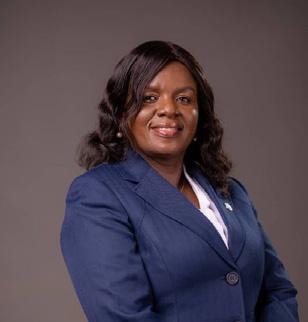



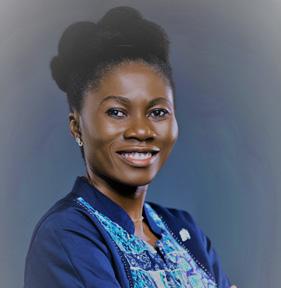




The awardees will be celebrated during the Angaza Forum in Kigali which will feature an array of compelling speakers, knowledge presentations and training. The event will take place at Norrsken Kigali House, one of the most sustainable buildings in Kigali. The Angaza Forum culminates with excursions and activities that will deliver a first-hand experience of Rwanda’s unique approach to socio-economic development, which has positioned the fast-growing economy as an epicenter for innovation anchored on the Sustainable Development Goals. The event will be held in partnership with The Sustainable Development Goals Center for Africa, Women in Finance Rwanda Foundation together with Kaleidoscope Consultants, Rwanda Bankers Association, Capital Markets Association of Zambia, Organization of Eastern and Southern Africa Insurers, Women on Boards Network Kenya, and Leading Ladies Network Ghana with media partners Kenyan Wallstreet, Digital Banker Africa, and Platform Africa.
For more information visit www.angazaforum2023.com.

 Renen Watermeyer Founder & CEO SASA Solutions
Renen Watermeyer Founder & CEO SASA Solutions


Agriculture is a critical sector in Africa, providing livelihoods to millions of people and contributing to the continent’s economic growth. Despite the vital role that agriculture plays in Africa, there are numerous barriers that prevent smallholder farmers from accessing land, credit, and markets. These barriers have persisted for decades and have had a significant impact on the ability of these farmers to succeed in agriculture. Limited access to financial services inhibits farmers’ ability to manage risks, invest and expand production, and drive improvements in their livelihoods and the well-being of their families.
Women farmers face additional challenges relative to their male counterparts. The denial of land rights, prejudiced pricing, and a lack of authority in household decision-making perpetuate gender gaps, especially in agricultural contexts. Digital Financial Services (DFS) and digital platforms offer both
male and female smallholder farmers increased access to information, markets, and financial services by overcoming geographic, physical, informational, and even social barriers. Transparency and access foster financial inclusion and trust, empowering the previously marginalised to access financial services. Women, in particular, benefit from DFS and the transparency it brings.
In this article, we explore the various barriers to entry for women smallholder farmers in Africa and examine potential solutions to address these challenges. By understanding and addressing these barriers, we can create a more inclusive agricultural sector that empowers all farmers, regardless of gender or ethnicity.
Barriers to women’s demand for both conventional and digital financial products and services include, but are not limited to, the following:
The inability to access traditional “bricks and mortar” based financial services. This is largely due to women traditionally staying at home to look after the family, while men commute to urban centres in search of work.
to access financial services. For example, some cultures circumscribe, implicitly and explicitly, the rights of women
to contract independently of their husbands.
Limited literacy, prejudice, limited credit histories, and unconscious biases that can reduce access to financial products.
Many financial products are structured on an individual basis, reflecting Western norms and not the cultural realities of rural Africa where financial planning often occurs in the context of community saving and lending groups.
Limited land tenure and uncertainty over title, particularly for women, impede the ability of households to collateralize their property, limiting access to capital.
Competing demands on women’s time in terms of household and caregiving responsibilities, which means they have less time to engage in economic activities.
With the expansion of new technologies and financial products, trust has appeared as a key barrier to overcome, particularly for rural women who have limited access to everyday technologies like mobile phones.
Rural women’s lower literacy and levels of education translate into financial illiteracy, which in turn reduces their ability to access financial services appropriately.
Some of these barriers, such as land ownership, will require significant economic and political shifts to resolve. However, there are opportunities to catalyse change and transform agricultural value chains much more immediately. Driven by the same societal shifts that see a rise in demand for ethically sourced products, many large corporations are adopting ESGbased reporting frameworks, and other organisations are aligning with the United Nations Sustainable Development Goals. This, coupled with well-established technology trends and a bedrock of mobile money, are potent drivers of change. And we are starting to see these trends impact the entire agricultural supply chain, from conservation-aware agriculture in the Botswana panhandle to group inputs saving and purchasing in Uganda or cooperative-based saving and lending in Tanzania. These changes are catalysing real transformation across our continent.
Now that we have considered the academic perspective on the challenges facing women smallholder farmers, we will make use of the traditional African storytelling manner to highlight the plight of smallholder farmers through a real-life scenario
Once upon a time...
Farmer Neema was a smallholder rice farmer in rural Tanzania. And every year...
She grew crops to sell through the local rice cooperative and invested all her free cash into the crops. As the season progressed, she had less cash available for incidental expenses. Due to her rural location and limited connectivity, she struggled to access quality, well-priced inputs, information, and financial services. She had to travel to the nearest village and negotiate with the local agrodealer for agro-inputs. This was not only time-consuming but also fraught with difficulties due to inferior products, logistical challenges, and discrimination.
Until one day…
Neema’s rice cooperative recently digitised its operations by implementing a digital platform, which provided information through appropriate mobile channels, direct access to input suppliers and off-takers, as well as access to financial services and products.
from input suppliers and sell her produce at competitive prices to off-takers in a transparent manner. Additionally, she could now access appropriate financial products, such as savings accounts and credit products, to assist with her cash flow challenges.

As a result...
Neema was able to increase her crop yield and realise better prices for her produce, increasing her overall productivity. Not only did she have more cash, but she also had access to financial support, which allowed her to borrow or access inputs on credit to further invest in her farming activities in the next season.
Until finally...
Neema positioned herself to meaningfully grow her farming operations considerably and realise financial freedom. Her family now had access to financial support for medical services or to secure a decent education for her children.
and government agencies to engage, transact, and understand smallholder farmers. We synthesise digital profiles, provide access to critical financial products, as well as pertinent information to smallholder farmers. In combination, this creates transparency and starts to move farmers into the digital economy.
At every interaction, farmer profiles are incrementally enhanced with data, photographs,
And because of this...
Neema was able to use her existing mobile feature phone, in her own language, to access information on crop and input prices, as well as weather and farming tips. She could also purchase quality inputs at market-related prices directly
This may seem like a pipe dream, but by bringing key stakeholders together, such as input companies (seed, fertiliser), off-takers, financial institutions, aggregators, government agencies, or NGOs, and enabling them through a single digital platform, this dream becomes a reality.
One such platform that we believe fits the bill is our very own SASA platform. SASA empowers agribusinesses, financial institutions, NGOs,
and insurance products. The SASA platform promotes responsible lending by enabling farmers to lend against future revenue streams secured by the produce they are growing. This allows them to access capital at critical times in the production process to purchase much-needed inputs to improve their crop yields and quality.
SASA’s platform is simple to use and accommodates varying levels of financial literacy among farmers. It is embedded with a suite of mobile engagement tools (USSD, SMS, WhatsApp, Apps), which allows our solutions to be customised based on a farmer’s specific cultural and
economic circumstances and the maturity of local infrastructure. All engagements are recorded in a robust reporting and secure financial back-end, which integrates with any number of third-party service providers via APIs (e.g., banks, MNOs, databases, etc.). This provides reach to businesses and NGOs, facilitating the delivery of impactful and relevant solutions. This can even be extended to the end consumers of the agricultural products themselves, who will be able to trace their purchases back to the farmers that were originally part of the agricultural support program.
The platform is channel and partner agnostic, allowing a flexible and tailored solution, ensuring the most appropriate partners/service providers are included in the solution. There is no limit to the number of partners, which ensures farmers have access to the most appropriate services at all times.
Working closely with relevant partners, the SASA platform has the potential to enable smallholder farmers to change the face of the agricultural sector in Africa and make Neema’s journey a reality!

The potential impact of Artificial Intelligence (AI) on the African banking sector is garnering significant attention, as financial technology (fintech) and telecommunications companies challenge traditional banks to embrace technologybased solutions. A recent report revealed that 51% of surveyed banks across Africa consider digital
transformation as a crucial factor for their growth strategy, with AI emerging as the most critical element in driving innovation and redefining banking practices.
While fintechs and related services have been perceived as threats to traditional banks, AI is now viewed as a vital tool to deliver better services and enhance the customer experience. Early adopters of AI in

the banking sector have already witnessed its benefits, and 69% of surveyed banks recognise AI as the most important technology trend of the year. This shift in perception is particularly significant for Africa, where customer engagement and personal connections play a crucial role in banking.
Retail banking, which facilitates the bank-customer relationship
and drives engagement, has become a top priority for banks. Many banks are turning to AI-driven chatbots to improve the retail banking experience. Nigerian banks such as Zenith Bank, Fidelity Bank, First City Monument Bank, UBA Group, Access Bank, Heritage Bank, and Keystone Bank have successfully integrated chatbots to engage with customers and deepen retail penetration.
In addition to chatbots, banks are focusing on market-specific engagement platforms driven by AI. For instance, the Mauritius Commercial Bank developed a digital platform tailored to small and medium-sized enterprises (SMEs). This AI-based platform has rapidly transformed the bank’s digital capabilities and serves over 1,000 businesses.

Collaborative models involving partnerships with fintechs and challenger banks are also emerging, going beyond the traditional institution-centric approach. KCB bank in East Africa, for example, partnered with fintech company Sopra Banking Software to integrate savings and lending products into the KCB Vooma platform.
While the adoption of AI in the African banking sector presents immense opportunities, caution is advised, as the adoption of AI in the African banking sector is not without its challenges. One
significant hurdle is the limited access to data, as AI algorithms require large amounts of quality data to be trained effectively. Data scarcity, especially in certain regions and demographics, poses a barrier to the full utilisation of AI capabilities. To overcome this challenge, banks must explore partnerships and collaborations to access relevant data sources and develop robust data-sharing frameworks.
Another challenge is the shortage of skilled AI professionals on the continent. The demand for AI expertise is growing rapidly across industries, including banking. African banks must invest in talent development and collaborate with educational institutions to cultivate a pool of AI professionals who can drive innovation and spearhead AI initiatives within the banking sector.
Ethical and social implications also need to be considered in the adoption of AI. Concerns around privacy, data security, and potential bias in AI algorithms have raised important questions about the responsible use of AI in financial services. Banks must prioritise transparency, fairness, and accountability in their AI systems, implementing rigorous ethical guidelines and ensuring proper governance frameworks are in place to address these concerns.
Despite these challenges, the potential benefits of AI in the African banking sector are immense. AI-powered solutions
can improve efficiency, enable personalised customer service, and automate compliance processes, helping banks to make better decisions, identify fraud, and enhance risk management. Along with this, AI can assist in analysing market trends, predicting patterns, and supporting more informed trading decisions, empowering financial institutions to stay competitive in a rapidly evolving industry.
As African banks push the boundaries of innovation, improve operational efficiency, and enhance customer services through AI adoption, the financial sector stands to undergo a transformative shift. By leveraging AI technology responsibly, African banks have the opportunity to revolutionise financial services, drive financial inclusion, and contribute to economic growth and development across the continent.
As the African banking sector continues to embrace AI, it is important to highlight some notable examples of AI implementation in financial institutions across the continent.
One such example is Kuda Bank, a Nigerian fintech start-up that launched a chatbot feature in 2021. This chatbot enables customers to conduct transactions through messaging platforms and provides real-time updates on account balances, transaction history, and other banking services. By leveraging AI technology, Kuda Bank has enhanced its customer engagement and streamlined its operations, offering a seamless and convenient banking experience.
In South Africa, Zande Africa, a fintech company, is utilising AI to provide microloans to small businesses. By leveraging AI algorithms to analyse creditworthiness and risk factors, Zande Africa can offer quick and efficient lending solutions to entrepreneurs who may have limited access to traditional banking services. This demonstrates how AI can bridge the gap in financial inclusion, empowering underserved communities and driving economic growth.
Kenyan fintech company Lendable has also leveraged AI-powered solutions to process loan applications within minutes. By automating the loan application and approval process, Lendable has revolutionised access to credit, making it faster, more efficient, and less cumbersome for individuals and businesses. This use case showcases how AI can accelerate financial services and promote financial inclusion in emerging markets.
While these examples illustrate the potential of AI in the African banking sector, it is crucial to address the challenges associated with AI adoption. African banks must overcome data limitations by exploring innovative approaches to data collection and analysis. Collaborations with technology partners, data-sharing agreements, and leveraging alternative data sources can help banks access the necessary data to train AI models effectively.
Moreover, investing in AI talent development is crucial to ensure a skilled workforce capable of driving AI initiatives within the banking sector. African banks can collaborate with educational institutions, establish AI training programs, and provide ongoing professional development opportunities to nurture a pipeline of AI professionals.
The adoption of AI in the African banking sector holds immense potential to transform financial services, enhance customer experiences, and drive financial inclusion. While challenges such as data scarcity and talent shortages exist, African banks can navigate these obstacles by fostering partnerships, investing in talent development, and prioritising ethical considerations. By embracing AI responsibly, African banks can position themselves at the forefront of innovation, shaping the future of banking and contributing to economic growth and development across the continent.


Blockchain technology is transforming various industries globally, and Africa is no exception. The year 2022 witnessed a significant surge in blockchain funding and investments across the continent. According to the African Blockchain Report 2022, published by CV VC in collaboration with Standard Bank, African blockchain startups raised a staggering $474 million, marking a remarkable 429% increase within a year. This growth demonstrates the rising confidence in the potential of blockchain technology to drive financial independence, infrastructure development, personal identification, and record-keeping in Africa

In 2022, Africa experienced a 12% increase in the overall number of blockchain deals, covering diverse sectors. Infrastructure, personal identification systems, recordkeeping solutions, and access to financial independence emerged as key areas of focus. The report highlights that African venture funding grew by 34%, totaling $3.14 billion, with blockchain accounting for a 15% share of
all venture funds in Africa. These statistics indicate that African blockchain startups are securing larger funding amounts, fostering increased investor confidence. This development is significant, considering Africa’s rise in global funding share surpasses that of any other region by a considerable margin.
In recent months, Africa has witnessed the emergence of its
first blockchain “unicorns”privately held startup companies with a valuation of $1 billion or more. The report cites Seychellesbased crypto exchange Kucoin and Scroll.io, a scaling solution for the Ethereum blockchain, as notable examples. These unicorn companies represent the growing potential and maturity of the African blockchain ecosystem, attracting global attention and further reinforcing Africa’s position as a hub for technological innovation.
Although Africa’s blockchain industry has experienced rapid growth, its share of global blockchain funding remains modest, increasing from 0.3% in 2021 to 1.8% in 2022. The distribution of deal value also shows geographic concentration,
with Seychelles and South Africa accounting for 81% of African blockchain funding. Nigeria leads in terms of the number of deals but lags behind in deal value compared to Seychelles and South Africa. While concentration exists, other African countries such as Liberia and Kenya are also making notable contributions to the blockchain landscape.
Despite the promising growth of the blockchain industry in Africa, there remains a significant knowledge gap among corporate leaders and decision-makers. Gideon Greaves, managing director of CV VC Africa, emphasizes the need for more corporate education on blockchain technology’s benefits. Many C-level executives still lack awareness and understanding of blockchain’s potential and its relevance to their organizations. Bridging this knowledge gap and providing comprehensive education on blockchain’s capabilities and applications are crucial steps toward fostering further growth and progress in Africa’s blockchain ecosystem.
The success of blockchain in Africa not only relies on funding and investment but also on widespread adoption and
implementation across sectors. To further propel the growth of the blockchain ecosystem, it is crucial to foster collaboration between governments, regulatory bodies, financial institutions, startups, and technology providers.
Education and awareness campaigns play a vital role in driving blockchain adoption. Efforts should be made to educate businesses, government officials, and the general public about the benefits of blockchain technology, including increased transparency, security, and efficiency in various processes. By showcasing successful use cases and demonstrating the positive impact of blockchain, more stakeholders can embrace the technology and explore its potential applications.

Collaboration and partnerships are essential to drive innovation and expand blockchain solutions. Governments and regulatory bodies can create favorable regulatory environments that encourage blockchain experimentation and adoption. Financial institutions can collaborate with blockchain startups to develop innovative financial products and services that cater to the needs of unbanked and underbanked populations. Technology providers can continue to enhance blockchain platforms, making them more scalable, secure, and user-friendly.
Moreover, leveraging blockchain technology can address specific challenges faced by African economies. For instance, blockchain-based digital identity systems can help establish secure and verifiable identification for individuals, enabling access to
financial services, healthcare, and other essential resources. Blockchain can also streamline supply chain management, enabling greater transparency, efficiency, and trust in the movement of goods, especially in the agricultural and manufacturing sectors.
Looking ahead, the future of blockchain in Africa appears promising. The continent has already demonstrated its potential to innovate and leverage technology to overcome challenges. As blockchain adoption grows, it is expected to have a transformative impact on various sectors, including finance, healthcare, agriculture, and governance. With continued investment, collaboration, and education, Africa has the opportunity to become a global leader in blockchain technology.
The exponential growth of blockchain funding and investments in Africa is a testament to the continent’s potential for technological innovation and economic development. The emergence of blockchain unicorns and the increasing confidence of investors reflect the growing maturity and relevance of blockchain solutions in Africa. However, there is still work to be done to bridge the knowledge gap and ensure wider adoption of blockchain technology. By fostering collaboration, promoting education, and creating a favorable regulatory environment, Africa can harness the transformative power of blockchain to drive inclusive growth, financial independence, and prosperity for its people.


In Africa, as the financial and banking services industries continue to embrace digital transformation, cybersecurity is a growing concern for regulators and executives. Cyber attacks have increased in sophistication and frequency, and the consequences can be devastating for financial institutions, including reputational damage, financial loss, and legal liability. In this context, it is imperative to enhance governance requirements that increase board and executive responsibility for cybersecurity. Cybersecurity has become a necessity in today’s digitally interconnected world, especially for the banking and financial service sector. Cyber threats, such as ransomware attacks and phishing, pose a serious risk to both businesses and customers. Companies are investing in cybersecurity technologies, but there is still a need for improved governance requirements to increase executive and board accountability for cybersecurity. These requirements are even more important in Africa’s banking sector, which is a highrisk area for cybersecurity.
Governance is an essential component of effective cybersecurity. It includes the policies, practices, and procedures that govern how an organisation protects and manages its digital assets. In order to have effective cybersecurity governance, the board of directors and executive management must be involved in the setting of cybersecurity strategy, risk management, and oversight. The board of directors’ ultimate responsibility is to oversee the cybersecurity of an organisation. The board must set clear expectations with executive management on cybersecurity matters and regularly review the organisation’s risk management and cybersecurity strategies. Executive management should, in turn, develop and implement effective policies and procedures for cybersecurity, allocate adequate resources, and report regularly to the board about cybersecurity risks and incidents.
Cyber threats are becoming more complex and frequent, and therefore it is necessary to enhance governance to make board members and executives more

accountable for cybersecurity. This enhancement will ensure that cyber risks are treated with the same attention and focus given to other strategic risks within the organisation. Cyber threats can have serious financial, legal, and reputational consequences for businesses. Inadequate cybersecurity measures may lead to data breaches and financial losses as well as regulatory fines and reputational damage. It is, therefore, essential that executives and boards understand the cybersecurity threats facing their business and take appropriate steps to mitigate them. Implementing enhanced governance requirements will help increase the accountability of board members and executives for cybersecurity.
Cybersecurity Training: Executives and board members should be regularly trained in cybersecurity to ensure they are aware of the latest cyber threats and how to defend their business against them. The training should include topics such as phishing scams and ransomware attacks.
Companies should regularly conduct risk assessments in
order to identify vulnerabilities and cybersecurity risks. These assessments should be reported back to the board, and appropriate measures taken to mitigate risks.
Incident Response Plans: Companies should have plans that detail the steps they will take in the event of an incident involving cybersecurity. Plans should be reviewed and updated regularly, and any changes should be communicated to the board.
Public Disclosure: Companies must publicly disclose any cyber incidents that could have an impact on customers or stakeholders. This disclosure should be done promptly and include the details of the incident as well as the steps taken to minimise its impact.
governance requirements. Disclosure of cybersecurity incidents to the public can promote transparency and accountability and allow stakeholders to evaluate the cybersecurity risk profile for financial institutions. This also encourages financial institutions to invest in cybersecurity risk and improve their cybersecurity posture. In light of the increasing cybersecurity risks in the banking and financial sector, it is important
The Cybersecurity Act 2020 in Ghana includes provisions that require mandatory reporting of cyber incidents to the designated responsible bodies. Similar regulatory frameworks have been introduced in other African countries to improve cybersecurity governance and public disclosure.
In the Central Bank of Nigeria’s Cybersecurity Guidelines for Deposit Money Banks and Payment Service Providers, for example, financial institutions are required to report cybersecurity incidents to the Central Bank of Nigeria as well as to other regulatory bodies. Financial institutions are also required to perform regular assessments of cybersecurity risks and implement effective cybersecurity control measures.
Timeline: Regulators should specify a timeline for companies to disclose cybersecurity incidents. The timeline should be reasonable and allow companies enough time to investigate and assess the impact of the incident.
Content: The regulations should specify what information is to be disclosed, such as the details of the incident or the mitigation measures taken. Disclosure should be concise, clear and accessible to all parties.
Enforcement: The regulations should state the consequences for non-compliance. The severity of the incident should determine the consequences. This will act as a disincentive to non-compliance.
Collaboration: Regulators should encourage companies to collaborate with regulators when a cybersecurity incident occurs. This collaboration can reduce the impact of an incident and help prevent it from recurring.
The banking and financial service industry in Africa must enhance governance requirements to increase board and executive responsibility for cybersecurity. In order to combat the increasing complexity and frequency of cyber threats, it is essential that governance requirements are enhanced. This will ensure that cybersecurity risks can be treated as enterprise-wide risks, and that executives and board members have the skills and knowledge necessary to oversee cybersecurity. The public disclosure of cybersecurity requirements is a key aspect of enhancing governance. Regulation of public disclosure can promote transparency and accountability in Africa’s financial and banking services sector and allow stakeholders to assess the cybersecurity risk profile of financial institutions. Effective cybersecurity governance and public reporting will be critical as the industry continues its digital transformation. This will ensure the security and resilience of the financial system.
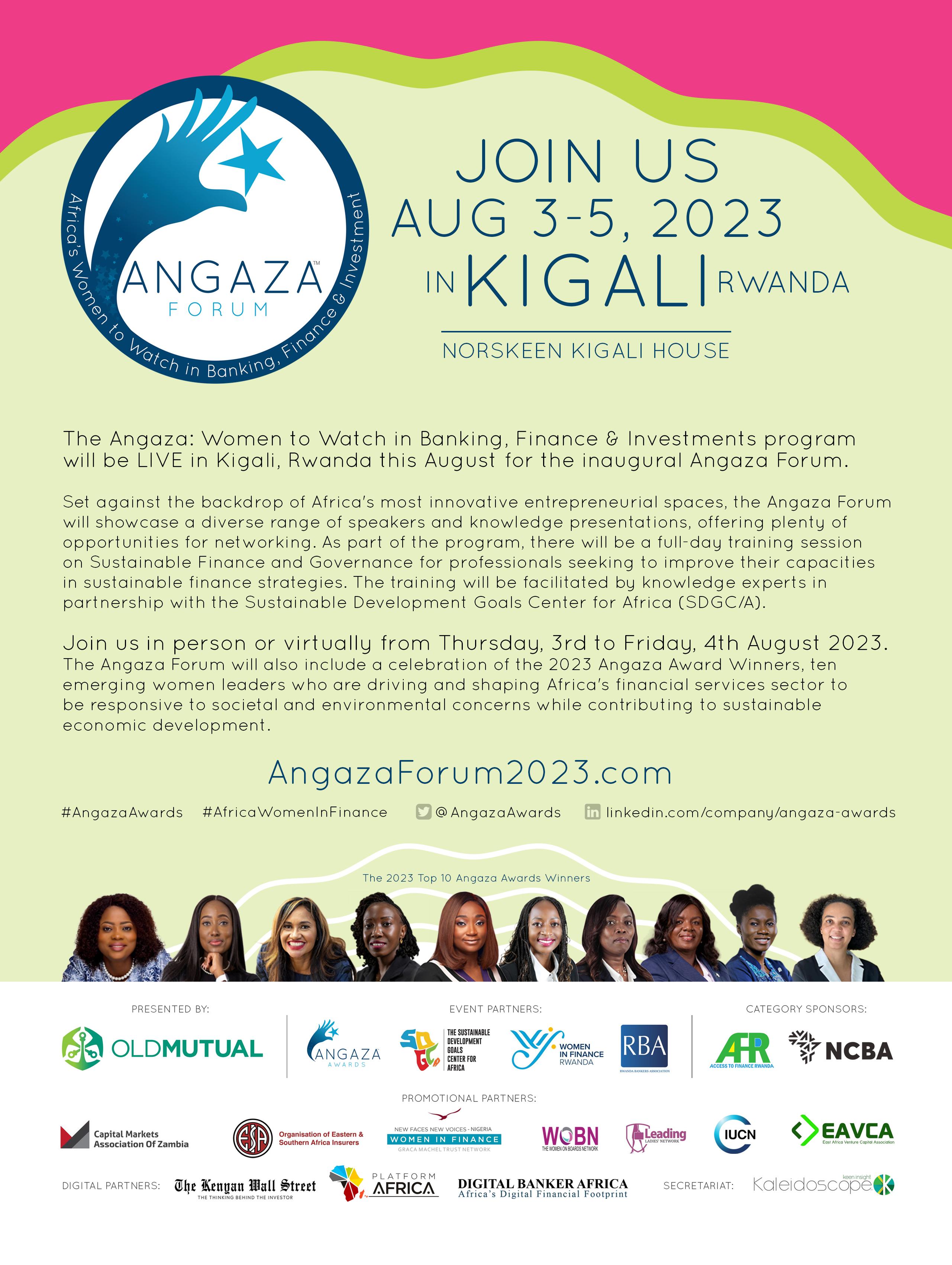
Open Banking is a financial system in which banks and other financial institutions make certain data about customers’ financial transactions and account information available to authorized third parties using Application Programming Interfaces (APIs). This enables customers to securely share their financial information with other companies, such as fintech firms and financial service providers, in order to access new and innovative services such as budgeting tools, comparison websites, and financial advice. The goal of Open Banking is to increase competition in the financial industry and give customers more control over their financial data.
Open Banking is still in its early stages of development in Africa, but there are some initiatives underway to introduce it to the region. For example, the Central Bank of Nigeria has been working on a regulatory framework for Open Banking, and there have
been several pilot programs launched to test the concept. Others with similar exercises include the South African Reserve Bank, the Central Bank of Kenya, the Central Bank of Ghana, the Central Bank of Egypt, etc. all of whom have issued guidelines for open banking in their respective countries, and several banks have begun implementing open banking APIs. Additionally, there are some fintech companies that are working to enable open banking in Africa by building infrastructure and platforms for data sharing. However, due to the lack of standardization and regulations across different countries in Africa, open banking implementation can vary a lot among different nations. In addition, most African countries have low penetration of banking services, low technological literacy, and underdeveloped infrastructure, which are challenges that need to be addressed to make open banking possible.
There are several different models for implementing Open Banking, each with its own set of advantages and disadvantages. Some of the most common models include:
Direct API Access: This model involves customers giving third-party providers direct access to their financial data using APIs. This allows the third-party provider to access a wide range of data, but it also carries a higher level of risk as the customer’s data is being shared directly with the third party.
Account
Provider (AISP) Model: Under this model, third-party providers act as intermediaries between customers and their financial institutions. The AISP has the customer’s permission to access account information on their behalf and provides the customer with a consolidated
view of their financial data from multiple accounts. This model can provide a higher level of security as the customer’s data is only shared with the AISP, not directly with other third parties.
Payment Initiation Service Provider (PISP) Model: This model allows third-party providers to initiate payments on behalf of the customer directly from their bank account. This can be useful for services such as online shopping or bill payments, but it also carries a higher level of risk as the customer’s bank account details are shared with the third party.
Hybrid Model: This model is a combination of the AISP and PISP models, which allows the customer to share their financial data and initiate payments through a single third-party provider. This can be more convenient for the customer, but it also increases the risk as the customer’s data and bank account details are shared with a single third party.
Sandbox Model: This is a simulated or closed environment to test open banking solutions or new fintech products. This allows the parties involved to test and validate the solutions before the official launch, with less risk. Many African countries
(who are currently exploring Open Banking) can be found here.
These are just a few examples, and other models may also be used depending on the specific requirements of a particular market or jurisdiction.
There are several challenges to implementing Open Banking in Africa, some of which include:
Lack of regulatory framework: There is a lack of standardization and regulations across different countries in Africa, which makes it difficult to implement Open Banking. This could also lead to confusion and mistrust among customers
and providers.
Lack of infrastructure: Most African countries have underdeveloped infrastructure, which can make it difficult to securely transmit and process large amounts of financial data.
Cybersecurity concerns: Sharing financial data through APIs and other digital channels can increase the risk of data breaches and cyberattacks. This is a concern for both customers and financial institutions, as they need to ensure that their sensitive financial data is protected.
Limited banking services: Most people in Africa have limited access to banking services, low technological literacy, and low income. This can make it difficult for them

to access and use the new and innovative financial services enabled by Open Banking. Limited access to financial data: Many banks and financial institutions in Africa have limited access to customer data due to a lack of IT systems and processes in place. This makes it more difficult for them to participate in Open Banking initiatives.
Low Level of Trust: Due to historical corruption and issues with financial institutions, there is a low level of trust in financial institutions and other service providers. This can make it difficult to get customers to share their financial data.
Addressing these challenges is key to making open banking possible in Africa and bringing benefits to end-users, financial institutions, and the economy. It is instructive to mention here that some of these challenges are at different stages of being addressed by different stakeholders across several markets in Africa. For instance, many fintechs are emerging across the continent and are tackling the challenges of deepening financial services by customizing and curating several VAS offerings and making them available and accessible to consumers. Moreover, many African governments have either issued or are in the process of issuing regulatory frameworks for open banking operations, the Consumer Data Protection Laws and Regulations, and similar laws to address some of the challenges listed above.
Despite these challenges, many enthusiasts have predicted that open banking will gain momentum in Africa in the coming years as it has the potential to bring several benefits to the region, including increased financial inclusion, greater competition, and improved access to financial services.
One of the major drivers for open banking in Africa will likely be the increasing use of mobile technology and digital financial services, which are already being used by many people in the region. The use of smartphones, mobile money, and digital banking services is on the rise across Africa, and this trend is likely to continue in the future. This can provide a solid foundation for open banking to be built on.
Another important factor is the increased focus on financial inclusion and digitization by governments in Africa. Open banking can help to achieve this by providing more financial services to more people. This can be especially important in Africa, where many people do not have access to traditional banking services and are therefore excluded from the formal financial system.


It is my belief that open banking can serve as an accelerator for
deepening micro-credit access in Africa and delivering the scale that the micro-credit segment is in dire need of. I have captured my views in this regard in the last section of this article. Overall, the future of open banking in Africa looks promising, but the journey ahead may be challenging. It will require collaboration, investment, and effort from all stakeholders. If these challenges are addressed, open banking has the potential to bring real benefits to the region.
The EFInA micro-credit survey of 2018 indicated that only 5%
of the 33% of the borrowing adult population in Nigeria use formal credit products, 18.1% use informal credit channels such as moneylenders while 76.3% rely on family & friends. This portrays that many adults are unable to access unsecured credits from their banks as many of these banks are unable to expand their credit net beyond those 5% who are either fully or partially banked with them, wherein the KYCs of these customers are available for potential credit scoring and analysis. This is despite the pressure from the regulator compelling many of these banks to meet the Loan-to-Deposit Ratio (LDR) requirement. Perhaps, this is a gap open banking can quickly fill.
Open banking has the potential to help deepen microcredit in Africa by providing financial service providers with more information and data on potential borrowers. By sharing financial data through APIs, financial service providers can gain insight into customers’ financial history, income, and expenditure, which can help them make better-informed lending decisions.
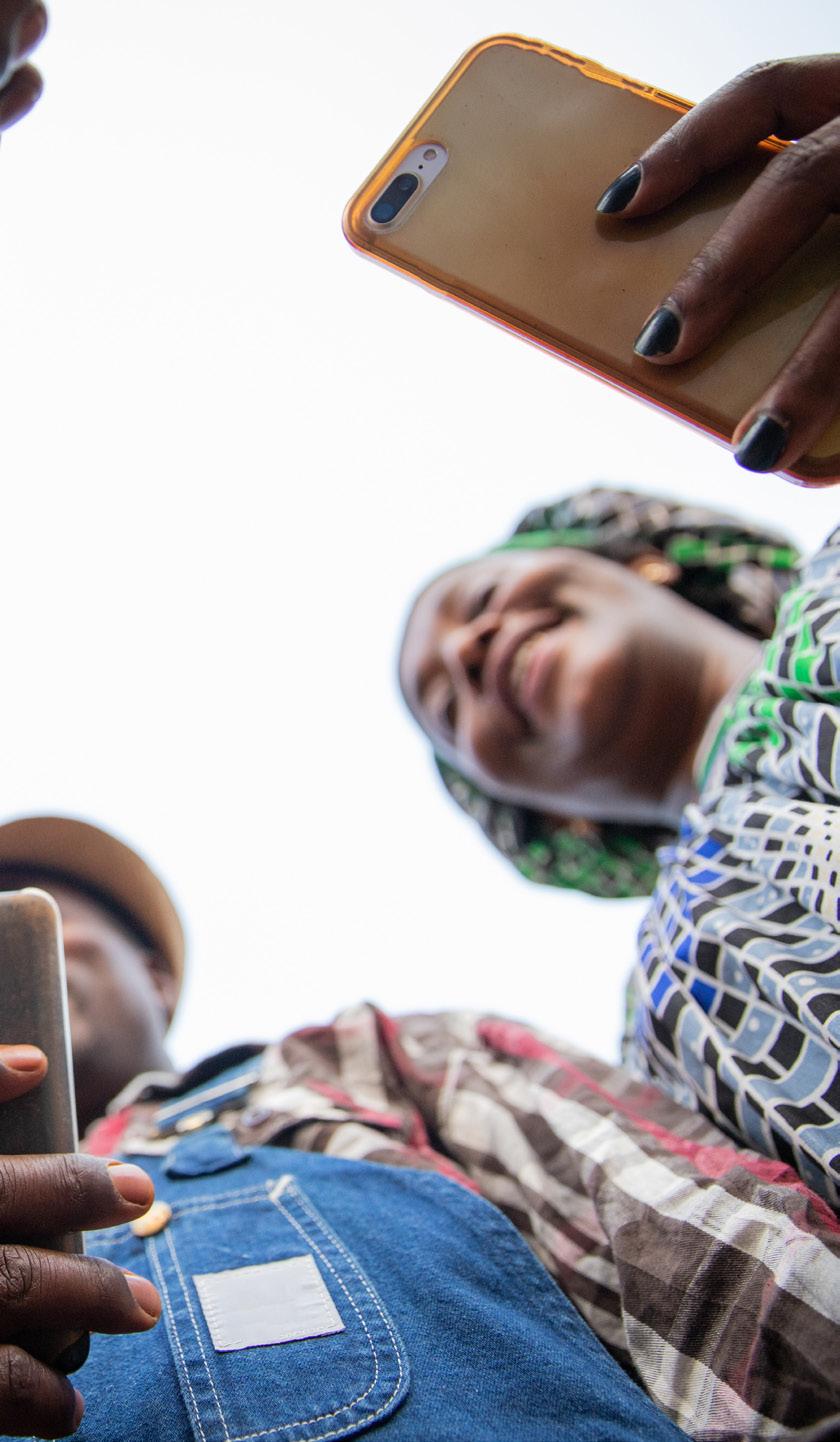
This can make it easier for individuals and small businesses who lack traditional credit history to access credit, as well as reduce the cost of assessing the creditworthiness of borrowers.
Open banking can also help to increase the availability of microcredit by making it easier for financial service providers to reach more customers. By using data from multiple sources, financial service providers can gain a more complete view of their customers’ financial situation and offer targeted products and services.
Additionally, Open Banking enables the use of innovative technologies, such as credit scoring algorithms, which can help to increase the efficiency and reduce the cost of assessing the creditworthiness of borrowers, thus making microcredit more accessible for more people. Furthermore, Open Banking enables the use of digital platforms, such as mobile money, to reach customers who are not yet connected to the formal financial
system, thus expanding the reach of microcredit.

However, it is important to consider that Open Banking alone may not be enough to solve the problem of limited access to microcredit in Africa. There are other factors, such as political and economic instability, lack of trust in financial institutions, and lack of access to financial education, that can make it difficult for microcredit to reach its full potential. Therefore, Open Banking should be seen as one tool among others to help deepen microcredit in Africa.
AZUKA MORDI is a digital commerce and payments services subject matter expert with over a decade of experience in the financial services industry – spanning Fintech (with eTranzact Int’l PLC); Banking (with Access Bank & FirstBank of Nigeria); Cards & Payment Technology (with Mastercard) –and currently, he is in the Financial Services Advisory Consulting team of PwC Ireland where he oversees Digital Banking and Solutions.

AAfrica’s banking landscape has undergone a significant transformation in recent years, largely driven by the rise of mobile money. With traditional banking services limited or inaccessible to many, mobile money has emerged as a game-changer, enabling millions of Africans to access basic financial services. In this article, we will delve deeper into the role of money in transforming Africa’s banking landscape, with a particular focus on forex brokers in Africa.

1. Mobile Money: A Catalyst for Financial Inclusion Mobile money has revolutionized financial inclusion in Africa, bridging the gap between the unbanked population and formal financial services. The widespread availability of mobile phones has allowed even those in remote areas to conduct transactions, such as money transfers, bill payments, and purchases, using their mobile devices. Forex brokers in Africa have capitalized on this trend by providing accessible and user-friendly platforms for individuals to engage in foreign exchange trading.
2. The Growth of Forex Trading in Africa: Forex trading, once a domain limited to institutional investors and the financially affluent, has now become accessible to a broader range of individuals in Africa. With the aid of forex brokers, Africans can now participate in the global currency market, potentially capitalizing on the volatility and opportunities presented by forex trading. This has opened up new avenues for wealth creation and economic empowerment in the region.
3. Advantages of Forex Brokers in Africa: Forex brokers in Africa offer several advantages to traders, contributing to the transformation of the banking landscape. These advantages include:
a) Accessibility: Forex brokers provide user-friendly platforms that can be accessed via mobile devices, allowing individuals to trade from anywhere at any time.
b) Education and Support: Many forex brokers in Africa offer educational resources, training materials, and customer support to help traders develop their skills and navigate the complexities of the forex market.
c) Localised Services: Forex brokers in Africa understand the unique needs and preferences of the local population, tailoring their services to cater to the African market. This includes accepting local currencies, providing localized customer support, and offering relevant trading instruments.
4. Driving Economic Growth through Forex Trading: Forex trading has the potential to contribute significantly to economic growth in Africa. By providing individuals with opportunities to engage in forex trading, forex brokers are empowering them to diversify their sources of income and build wealth. Additionally, forex trading can stimulate entrepreneurship and investment by enabling individuals to generate profits that can be reinvested in local businesses and projects.
5. Overcoming Challenges and Building Trust: As with any financial service, forex trading in Africa faces certain challenges that need to be addressed for sustainable growth. These challenges include ensuring regulatory oversight, addressing concerns
related to fraud and security, and promoting transparency in the forex market. Forex brokers, regulatory bodies, and other stakeholders must collaborate to establish robust frameworks that protect traders and foster trust in the industry.
6. Strengthening Regulatory Frameworks: To ensure the long-term sustainability and stability of the forex trading industry in Africa, it is essential to strengthen regulatory frameworks. Regulatory bodies need to establish clear guidelines and standards for forex brokers, ensuring transparency, fair practices, and protection of traders’ interests. This includes monitoring brokers’ compliance with antimoney laundering (AML) and know-your-customer (KYC) regulations to prevent fraudulent activities.
Collaboration between regulatory bodies, industry experts, and forex brokers is vital in shaping effective regulations that strike a balance between investor protection and fostering innovation. Regular audits and inspections can help maintain the integrity of the forex trading ecosystem, promoting trust and confidence among traders.
To fully harness the potential of forex trading and ensure the success of individual traders, enhancing financial literacy is crucial. Many Africans may be new to forex trading and need access to educational resources and training programs. Forex brokers can play a significant role in providing comprehensive educational materials, webinars, and tutorials to help traders understand the intricacies of the forex market, risk management strategies, and technical analysis.
Additionally, collaborations with educational institutions, NGOs, and government agencies can further promote financial literacy initiatives. By empowering individuals with the necessary knowledge and skills, forex trading can become a sustainable avenue for wealth creation and economic growth in Africa.
8.
Technological advancements have played a pivotal role in transforming Africa’s banking landscape, and the forex trading industry is no exception. Forex brokers should continue to invest in cuttingedge technology to provide traders with reliable and secure trading platforms. This includes robust risk management tools,
real-time market data, and seamless transaction execution.
Moreover, embracing emerging technologies such as blockchain and artificial intelligence can further enhance transparency, security, and efficiency in forex trading. By leveraging innovative solutions, forex brokers can offer traders a competitive edge and contribute to the overall development of the financial sector in Africa.
9. Collaboration and Partnerships: Collaboration among various stakeholders is key to unlocking the full potential of forex trading in Africa. Governments, regulatory bodies, forex brokers, financial institutions, and educational organizations should work together to create an ecosystem that fosters growth and protects traders’ interests.
Partnerships between forex brokers and local financial institutions can facilitate easier deposit and withdrawal options, promoting liquidity and convenience for traders. Collaboration with fintech companies can also drive innovation and introduce new products and services that cater specifically to the needs of African traders.
While forex trading presents significant opportunities, it is essential to diversify financial services available to Africans. Forex brokers can explore additional investment options such as commodities, indices, and cryptocurrencies, allowing traders to diversify their portfolios and capitalize on a broader range of assets.
Furthermore, fostering entrepreneurship and supporting small and medium-sized enterprises (SMEs) can stimulate economic growth. Forex brokers can partner with local businesses, providing them with financial services, funding options, and expertise to expand their operations and contribute to job creation.
Conclusion: The transformation of Africa’s banking landscape through the emergence of mobile money and forex brokers has opened up new horizons for financial inclusion and economic empowerment. By strengthening regulatory frameworks, enhancing financial literacy, fostering innovation, and promoting collaboration, the forex trading industry can continue to thrive and contribute to Africa’s economic growth. It is an opportune time for stakeholders to seize the momentum and work together to unlock the full potential of forex trading in Africa, ultimately creating a prosperous and inclusive financial ecosystem.


A champion for financial inclusion, Audrey has proactively led the small and medium-sized enterprises (SME) unit at Absa Ghana, where she oversees the Agency banking proposition, women banking proposition, and MasterCard Foundation Young Africa Works program, among others.
Her performance outcomes include a 65 percent year-on-year growth in income and 57 percent year-onyear growth in customer deposits -- achieved amidst the current economic challenges faced globally and within the Ghanaian market. Moreover, the bank’s SME portfolio grew by 21 percent. In 2020, at the heart of the Covid Pandemic, she led the process to conceptualize and launch Absa’s women banking proposition.


Through the Africa Works Program, more than 5,000 SMEs have been trained on business management. The project which aligns with the Sustainable Development Goal on gender, decent work and innovation, has so far disbursed USD 18.44 million to more than 4,900 SMEs, creating more than 9,000 jobs. These efforts have been celebrated in Ghana with Absa winning awards for SME banking and empowerment of women clients.
As a facilitator and public speaker, Audrey has personally trained and
engaged thousands of business owners on financial and banking related matters. Audrey also serves as board chair of Rehoboth Foundation Ghana, which is an international organization that provides strategic leadership development services for church and corporate establishments. She also supports various charities that extend health screening, water infrastructure and educational support to poor and marginalized communities across Ghana.
As managing director, Sheila is the iRisk’s chief strategist, responsible for achieving short- and long-term objectives while producing value for shareholders and other stakeholders. She joined iRisk in 2017 as executive director and became managing director in 2018. During this period, she led the transformation of iRisk -from a startup with little operational framework into a reputable insurance brand in Ghana.


Under her leadership, the company has grown its revenues by 1,000 percent. In 2020, following a directive from the National Insurance Commission for brokers to recapitalize, she led the recapitalization exercise which exceeded the regulator’s requirements by a scale of four. The Insurance Commission ranked iRisk as the fifth-largest insurance brokerage firm in Ghana in terms of revenue in 2020 and 2021, out of more than 100 regulated firms, despite the fact that the company only began operations in 2017. It is worth noting that the top four insurance firms have all been in business for approximately 30 years or more.
Sheila led the company’s expansion into several sectors, including aviation, oil and gas, manufacturing and public sector. Her risk oversight includes the Government of Ghana’s
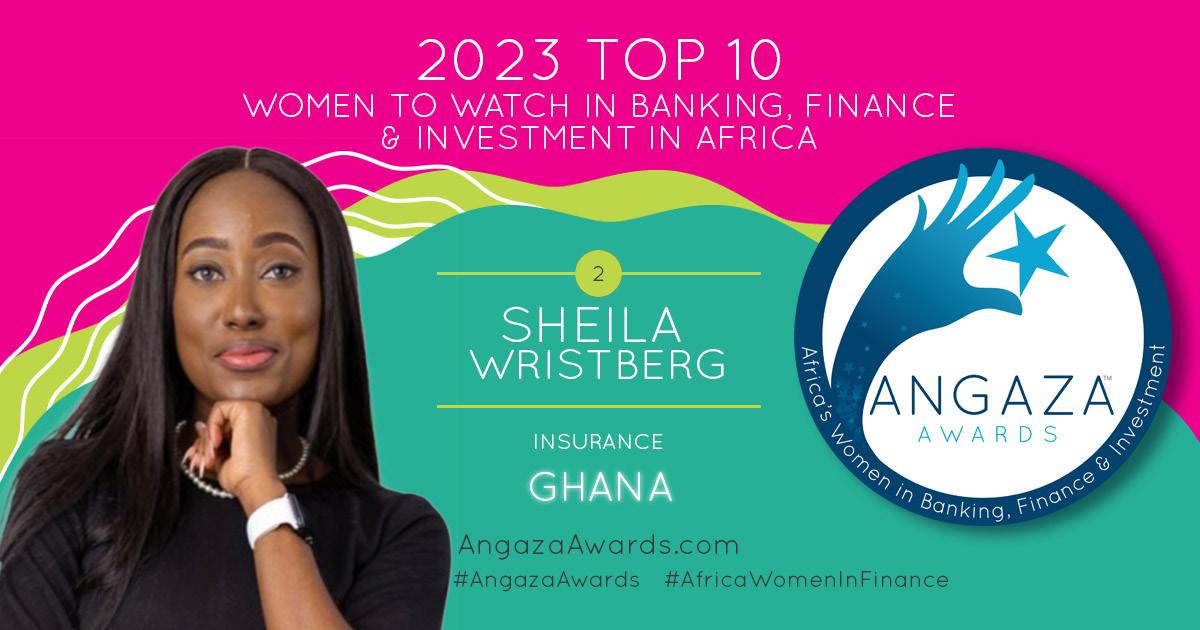
USD1.2 billion Hospital Infrastructure Project, a consortium of insurance companies which provided insurance coverage for the construction of 111 hospitals in all districts across Ghana.
Sheila is actively involved in the development of inclusive insurance products to serve the lower end of the population. In response to consumer pain points, her company has developed innovative products including a market stall insurance policy for women micro traders; and GHCompare, an aggregator website for insurance quotations and claims. Being a motorcyclist, she also spearheaded the development of a bespoke group life insurance policy for motorcycle clubs in Ghana.
In October 2022, she led iRisk to become a signatory to the Nairobi Declaration on Sustainable Insurance,
making the firm the first insurance brokerage and third company in the Ghanaian insurance industry to sign onto the declaration.
She serves as Vice-Treasurer of the Insurance Brokers Association of Ghana (IBAG) and is the youngest member of its executive council. She represents IBAG on the GIZ Program for Sustainable Economic Development and the National Insurance Commission’s Inclusive Insurance Planning Committee.
Her community impact includes an all-female motorbike group called Biker Girls GH that promotes safe riding and supports women’s empowerment, as well as advocating for better prison conditions and helping incarcerated women develop skills for reintegration into society.
Patty oversees the entire operations of Namibia National Reinsurance Corporation Ltd, ensuring that it is run successfully, maintaining profitability, running on sound business principles and achieving its mandate. She is a seasoned business and finance professional with over 30 years’ experience in the financial industry, of which 10 were at PriceWaterhouseCoopers (PWC), where she held the position of Partner: Tax, Strategic Advisory, Risk and Corporate Governance. She is currently the 2nd Vice-President of the Namibia Chamber of Commerce and Industry (NCCI).
Since joining NamibRe, Patty has grown the business from a small business to a medium business enterprise with investment grade credit rating, leveraging from gross profit premiums, increasing profitability and efficiency, and ensuring there is systematic shareholder return to the shareholders in the form of dividends.
In the 2019/20 Financial Year the Corporation recorded a recordbreaking Gross Written Premium of NAD 755 million (USD 41.7 million). Patty has led a team that has grown the business from USD 10 million to USD 50 million in the first five years of her leadership. In terms of profitability (the net underwriting
profit), NamibRe recorded an effective increase of 82 percent over the three-year period. Underwriting profits have grown significantly, and the company has recorded an increase in its asset component from NAD 200 million (USD 11 million) to close to NAD 1 billion (USD 55.3 million). Shareholders received consistent returns over the past few years.
NamibRe has a high profile in Africa, being positioned 30 in 2019 (top 50 Reinsurers, Atlas Magazine), to being ranked 22 in 2020, and currently 18. This is mainly on account of a combination of two factors namely, employing (and training) staff with the correct expertise and concerted strategy to grow the business of NamibRe not only in Namibia, but significantly enhancing business relations in the region and the Continent.
She strongly believes in thought leadership and continuous professional development; has a great passion for sustainability and an unquestionable drive for making a tangible impact in the insurance landscape. With her
backing, members of her executive team are enrolled in the prestigious HEC African Leadership course. Patty advocates for building women leadership, which has been demonstrated in her tenacious ability to get the Namibian Women in Finance annual initiative successfully established.
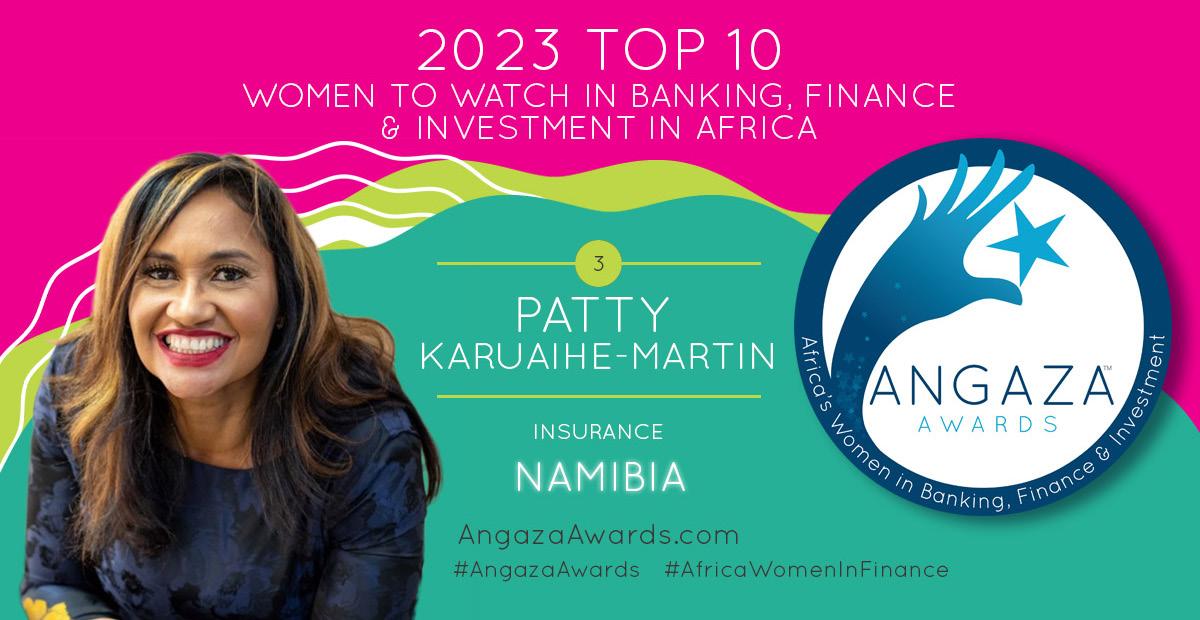
Patty advocates for staff and talent development, supporting employees not only with the pursuit of postgraduate degrees, but empowering a diverse staff complement and embracing competency development initiatives e.g., from someone being a cleaner to becoming a fully graduated member of the Claims team.
A champion for sustainable finance and responsible investment, she serves as the Co-Chair of the UNEPFI Global Steering Committee, is currently the Chairperson of the Organization for Eastern and Southern Africa Insurers (OESAI), an Executive Member of the Africa Insurance Organization (AIO), as well as its incoming Vice-President, starting her term in May 2023. These two represent reputable insurance bodies in Africa.
She serves as chairperson of JP Karuaihe Foundation, established in memory of Judge JP Karuaihe. The Foundation funds underprivileged Namibian students and has since supported over 70 deserving students, who are currently lawyers, directors, and judges adding value to the country’s socioeconomic development.
the offering to 15 currencies. In 2018, having seen the opportunities in interest trading, she introduced the Bond Trading desk. To date NMB commands a market share of 10 percent, and the bank has moved up the ranks from ninth position in the market to third. In the same period, she established the Securities Services desk which is now profitable and changing the way NMB invests.
have access to the finance they need due to challenges including lack of collateral or limited awareness of available financial products. IFC subscribed to 31 percent of the gender bond (equivalent to Tanzanian Shillings 10 million), which was listed on the Dar es Salaam Stock Exchange on 28 April 2022. The bank has also partnered with IFC to attain EDGE certification for green building.
Gladness manages NMB Bank’s Foreign Exchange exposure through trading in the Global FX Market and locally supporting customers -both SMEs and Corporates -- with their foreign currency demands. These customers may be importers or exporters. Through this, she has contributed to the Bank’s NonFunded Income by as much as USD20.5 million. She also manages the Bond Trading desk that arbitrages on interest rates movement. NMB’s turnover on this desk is close to US$ 50 million and the team has contributed to the Bank’s performance despite the recent changes in the market dynamics.
She leads the bank’s capital market preposition which includes the Securities Services unit that has Custodial services, registry services for listed companies and dividend processing. She also manages the bank’s own register for its corporate bonds as well as provides custodial services to both foreign and local investors allowing them participation in debt and equity markets.

Since joining the bank in 2014, she has helped drive growth through strategic risk taking while increasing
Responding to the low representation of women in the senior management within the bank, she established a platform for mentorship and leadership development and advancement. She also partnered with IFC (World Bank Group) to develop the two-year Finance2Equal program to rally banks and insurance firms to pledge to close gender gaps within their institutions.
Leveraging on the bank’s program for women, in 2022 she led NMB to issue the first Gender Bond called NMB Jasiri Bond that was subscribed by 197 percent and mobilized US$32 million for Women-owned small and medium-sized enterprises (SMEs). This bond was awarded Platinum Sustainable Bond of Year by the Global SME Forum. It is the first Gender Bond in Sub-Saharan Africa.
Currently, 75 percent of womenowned businesses in Tanzania don’t
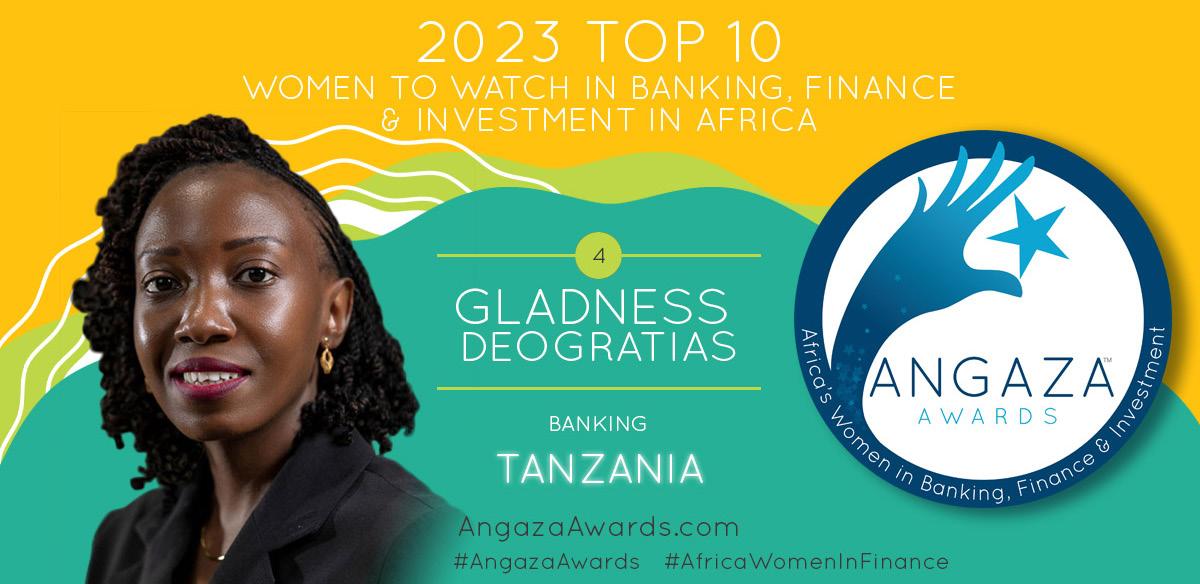
Gladness is a member of the Association of Women Leaders Network (Tanzania Chapter). In 2021, she was awarded the prestigious Eisenhower Fellowship. The Fellowship identifies, empowers and connects innovative leaders through a transformative fellowship experience and lifelong engagement in a global network of dynamic change agents committed to creating a world more peaceful, prosperous and just. Her Fellowship project was centered on accelerating green finance in Africa.
She is also a member of the NMB oundation Board of Directors and has been instrumental in ensuring the scholarships offered give equal opportunity to both female and male graduates. She also supports various initiatives, most recently donating an Oxygen system to a maternal hospital during the pandemic.
Elile is responsible for managing the overall operations and resources of the securities trading business of CardinalStone Partners Ltd. and ensuring strategic alignment and strategic objectives are achieved as well as financial performance. Doubling as the Chief Marketing Officer, she directly oversees the institutional sales and trading with key coverage being frontier fund managers, Hedge Fund Managers, and Africa-focused Fund Managers (in three major markets – North America, Europe, and Africa specifically South Africa) and local Fund Managers/Institutions seeking alpha returns in the Nigerian investment space.

Her leadership style has helped deepen relationships with clients, regulators, and other stakeholders; and she serves as a coach to her team, thus driving value to our stakeholders.
Her efforts have led the Nigeria securities trading firm from being a relatively new market entrant to being a competitive leader in terms of volumes and value traded. One of her key accomplishments is leading her team to execute the largest deal in the Nigerian Capital Market which was the sale of Nigeria’s second-oldest bank.
As the first non-owner Managing Director of the firm, she has directly
contributed to over 30 percent of the Group’s annual revenue growth. Leveraging on technical and people management skills gained in over a decade of experience covering securities trading, portfolio/ funds management, strategy, and investment advisory, she has been able to consistently achieve and exceed set targets across varied growth and profitability metrics. Overall, the firm has witnessed a 1,800 percent growth in revenue over a six-year period.
Elile is a keen advocate of work-life balance and its ability to promote staff wellness, improve productivity and guard against staff burnout in the highly pressurized securities trading environment. Therefore, she launched several wellness initiatives within the organization, such as convening an annual soccer match with other investment banking firms that help relieve stress and build intercompany camaraderie.
She currently serves as a member of the Governing Council of the Chartered Institute of Stockbrokers (CIS). CIS is the only body in Nigeria empowered to conduct qualifying examinations and provide professional qualifications to Stockbrokers, Securities Dealers, Financial & Investment Analysts, and Portfolio & Fund Managers. The Institute also regulates the activities of its members. Also, she is a member of several committees within the Nigerian capital market and continuously works with the regulators to deepen and grow a more robust Nigerian capital market.
Elile is an Associate member of the Women in Management Business and Public Service (WIMBIZ), a non-profit organization focused on increasing and supporting the success rates of female entrepreneurs and the proportion of women in senior positions in corporate organizations and public service.

Standard Bank Group is Africa’s largest bank, with presence in over 20 countries. As the Head of Documentary Trade Product for South Africa (Standard Bank’s largest single market and a major contributor to the group’s headline earnings), Nompilo leads the Documentary Trade department that is ranked number one in South Africa and has continuously held this position throughout 2022. Her portfolio of trade product solutions contributes over 50 percent towards Standard Bank South Africa’s total trade revenue and consists of several offerings, including Guarantees, Letters of Credit, Export Confirmations, Foreign Bills of Collection, Risk Participations, Trade Loans and Refinances.

Her deep passion for facilitating intra-Africa trade has been one of the biggest drivers of growth. In the year 2022, she collaborated extensively with corporations, financial institutions and internal colleagues in executing a vast number of trade transactions between several African countries, including Ethiopia, Nigeria, Ghana, Kenya and Angola. In addition, through partnerships with government departments such as the Johannesburg Chamber of Commerce and Industry, South African Revenue Services and Department of Trade and Industry, she conducted presentations to importers and
exporters on how they can leverage existing trade products and the African Continental Free Trade Agreement (AfCFTA).
One of her biggest contributions was the implementation of an automated document checking system which utilizes the latest technology such as Machine Learning to increase efficiency. She also led the implementation of risk participation agreements which enabled the bank to distribute assets and do more business in markets where there was appetite to increase market share, including Nigeria, Ethiopia and Ghana.
Education and thought leadership are two areas that are extremely
important to Nompilo. She is currently pursuing her Doctor of Philosophy degree in Business Finance at the University of the Witwatersrand. She has also lectured on Corporate Finance at the University of the Witwatersrand (between 2017 and 2019), a role she held as one the few black female finance instructors. She enjoys academic writing and has published a research paper titled: Are Dividend Changes and Share Repurchases A Good Predictor of Future Changes in Earning? She has also worked on thought leadership pieces on AfCFTA. In her spare time, she mentors students on personal branding, self-awareness and navigating the corporate world.
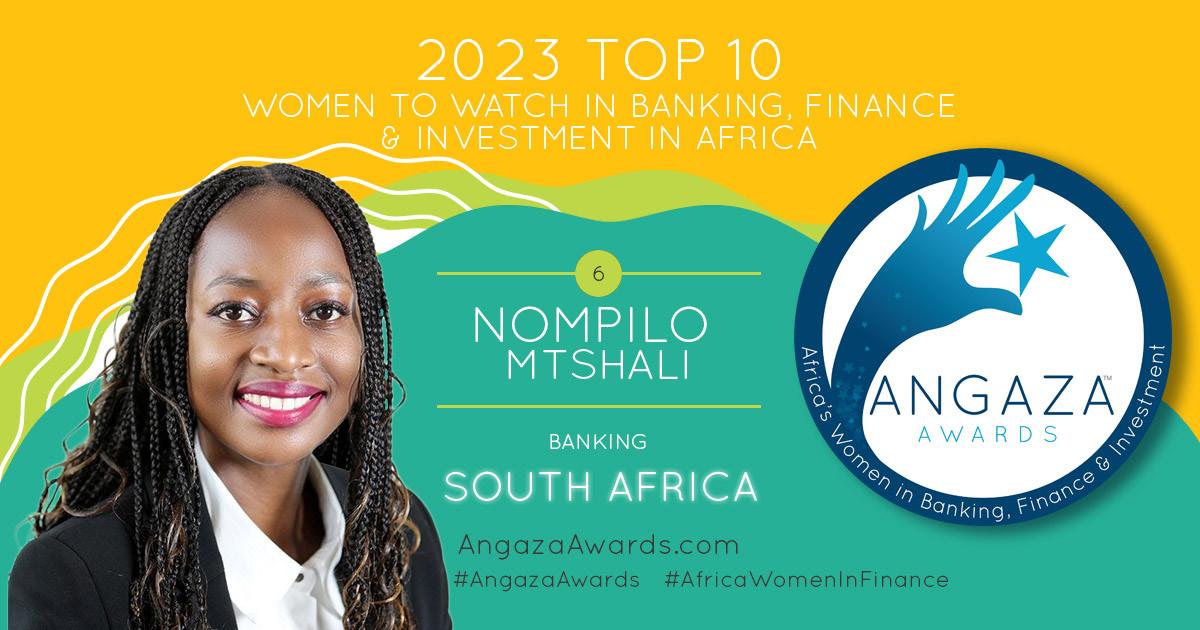
Caroline provides leadership in the Group formulation of the strategic direction of Co-operative Bank, the third largest bank in Kenya (according to the Central Bank of Kenya, 2021 report) and largest co-operative bank in Africa with 15 million members. In her role, she drives stewardship of the holding company and its subsidiaries, instituting controls, reporting and financial systems. She leads the development of performance management metrics and all controllership functions, as well as all reporting (including environmental, social and governance or ESG) and engagement with the regulatory bodies. She proactively engages with public markets, investors and the analyst community on behalf of the bank.
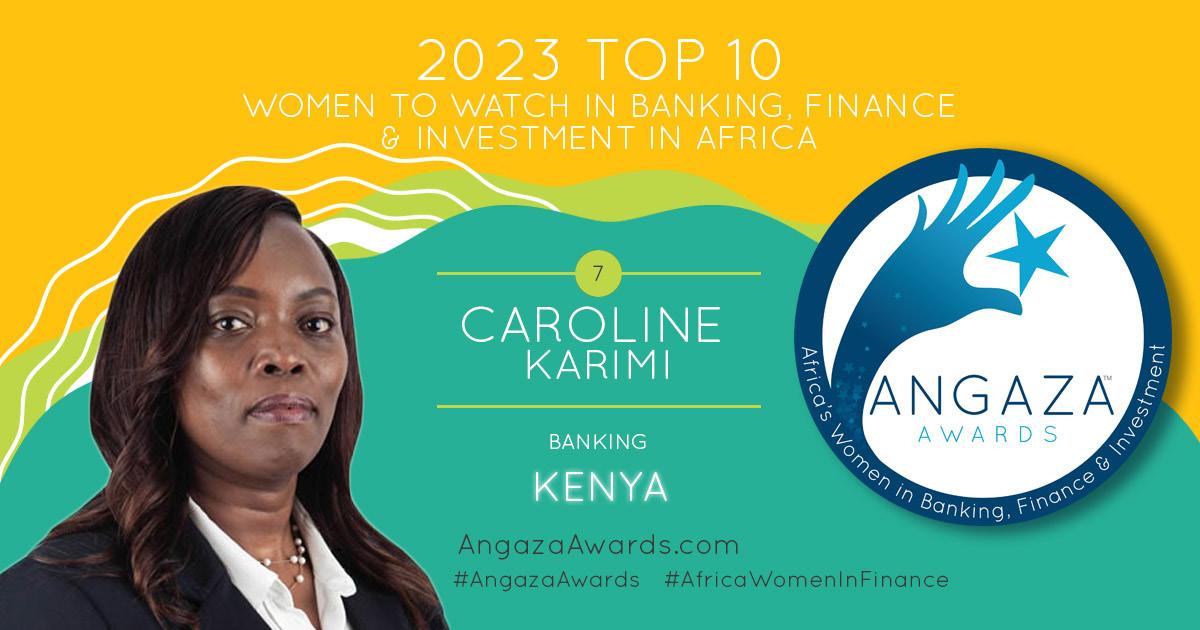
She has successfully led capital raising initiatives in the last two years, including USD 75 million in 2020 and a further USD 100 million that has gone into strengthening the banks’ core capital ratios. These funds have been sourced internationally with various multilateral lenders and other development finance institutions.
Caroline has risen through the ranks over 10 years with the bank -- from Senior Manager to Group Chief Finance Officer. Over her tenure, she has managed various transformation initiatives such as refinement of the Banks’ sourcing process. She provides oversight of the Treasury team, and in the last two years has revamped the bank’s ESG and sustainability initiatives, winning the Kenya Bankers Association Catalyst Awards. Her community service includes visiting hospice patients, and supporting children schooling in Pokot (region in Northwestern Kenya) in partnership with her local church.
MughoghoCharity is responsible for the end-toend customer and Channel Strategy at Standard Bank Malawi.
She heads several units, including Products, Affluent and High Networth segment, Personal Banking, Coverage and Distribution (Branch and ATMs), Customer Experience, Customer Call Centre, and Digital Banking which is responsible for all digital channels.
Under her leadership, the customer base has grown by 17 percent, customer deposits by 17 percent and loan portfolio by 47 percent. Her key areas of focus include risk management and cost management. Her contributions have led the bank to a year-on-year profit after tax growth of 58 percent and revenue growth of 32 percent.
Between 2020 and 2021, she led the bank in rolling out the first instant personal digital loan solution in the Malawi market with a loan tenor of up to 60 months and maximum unsecured loan of MK15 million (USD14 thousand) which was the biggest amount offered digitally in the market. This helped to give easier access to unsecured loans to Malawian business owners who normally would have found it difficult to access such loans. Competitors have followed in her steps, introducing similar products
in 2022 – a testament of her industry impact.
She has contributed to industry advocacy following changes within the policy environment arising from directives of the Reserve Bank of Malawi. Financial inclusion remains one of her key passions which she partially exercises in partnership with the Malawi Bankers Association and the industry regulator. One of her biggest contributions to the banking sector in Malawi is the onset of the Bancassurance business in the country, which she catalyzed. Today, Standard Bank Bancassurance contributed to the bank’s noninterest income.
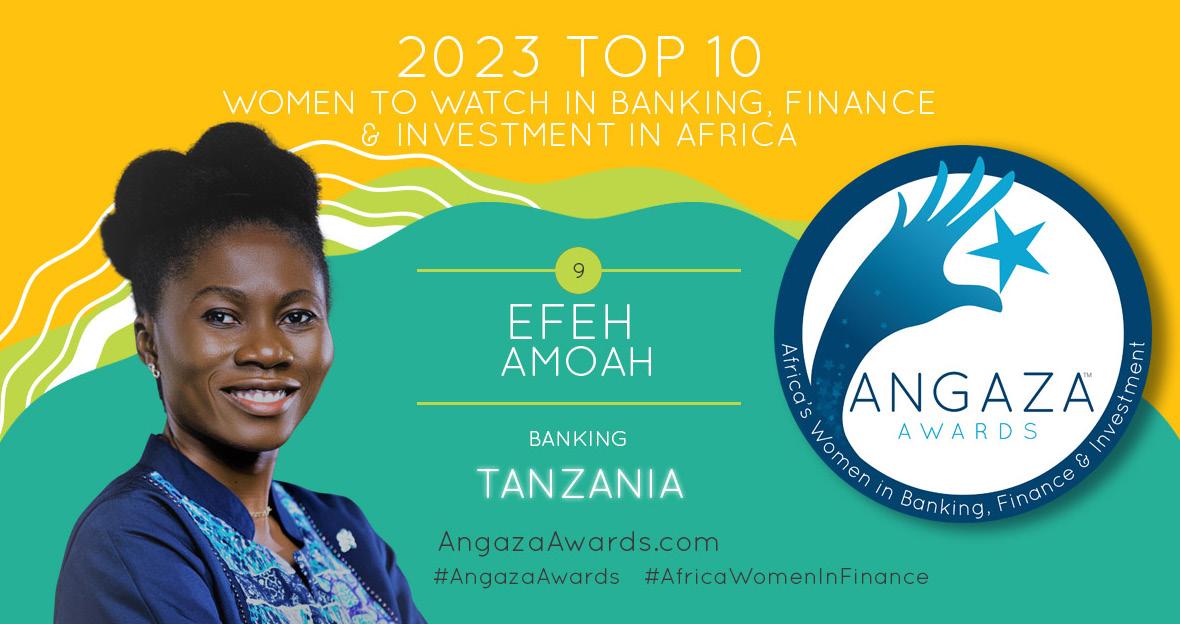

Her community service includes mentoring students in secondary schools, colleges and universities. One of her initiatives has reached 100 students to inspire them on how to become useful citizens and balance their lives as students.
Efeh leads Standard Chartered Bank Tanzania’s Transaction Banking department. Transaction Banking holds end-to-end accountability for the bank’s corporate banking deposits and trade and short-term lending book. Corporate Banking deposits constitute over 80 percent of the bank’s entire customer deposits in the market. The trade and shortterm lending book is 70 percent of the bank’s asset book.
As head of Transaction Banking, she defines and drives the execution of
the bank’s strategy for acquiring and maintaining corporate deposits and trade and short term lending assets. She also is responsible for the identification, acquisition and implementation of the bank’s payments and collections capabilities in Tanzania. Transaction Banking in the last year has introduced a new online banking interface for corporate clients, positioning the bank as one of the country’s leading enablers for regulatory payments. The team has also transformed trade transaction initiation for the bank’s corporate clients, winning significant business in the process.
She has helped unlock opportunities in the last year alone, moving the bank’s average core corporate deposits by USD130 million (40 percent on prior year) whilst leading the business to add circa USD300 million (60 percent growth) in trade assets and contingents in the same period. It is the first time in the bank’s history that this franchise has achieved the current levels of Transaction Banking deposits and assets. These achievements were the result of a clear business strategy,

strong leadership and collaborations as well as the tenacity to draw the needed enabling investments to the local franchise.
She also created fintech partnerships that strengthened fintech product capability and met client needs. Moreover, she has helped reactivate the nascent fintech Association, opening up opportunities for Tanzania’s fintechs to access the bank’s support networks such as the bank’s international fintech bridge and SC Ventures. To date, more than 12 fintechs have been introduced to SC Ventures and 15 representatives from Tanzania accepted in the bank’s Women in Cybersecurity mentoring programme, building the needed capacity in this critical area of financial services.
Efeh’s last two roles have straddled East and West Africa over the last five years. In her previous role, she led the bank’s advocacy and submissions on Central Bank’s payment system changes.
Since 2017, she has been actively involved in supporting the growth of healthy family relationships. Her interest in healthy families was birthed from personal experiences which led her to join like-minded persons to build a marriage support curriculum. As such, she currently co-leads a group of over 1,000 wives spread across Africa, Europe and North America. Using Telegram, Whatsapp and Zoom, she helps women and wives thrive in marriages through weekly online sessions, support groups and annual in person meetings.
 Orry Seem Group Head
Orry Seem Group Head
Orry currently oversees Ecobank’s cards and digital banking business across 33 markets with an overall revenue of more than USD 80 million. She develops and manages robust card and mobile financial services for Ecobank affiliates, including micro-insurance and credit products; P2P remittance transfer services; international, regional and domestic remittances; digital payments and disbursements; and B2P (salary) and G2P (government and social) disbursements. She also oversees digital services (virtual cards and card remittances) on digital platforms provided by the Bank, Telco operators, Fintech’s and Aggregators.
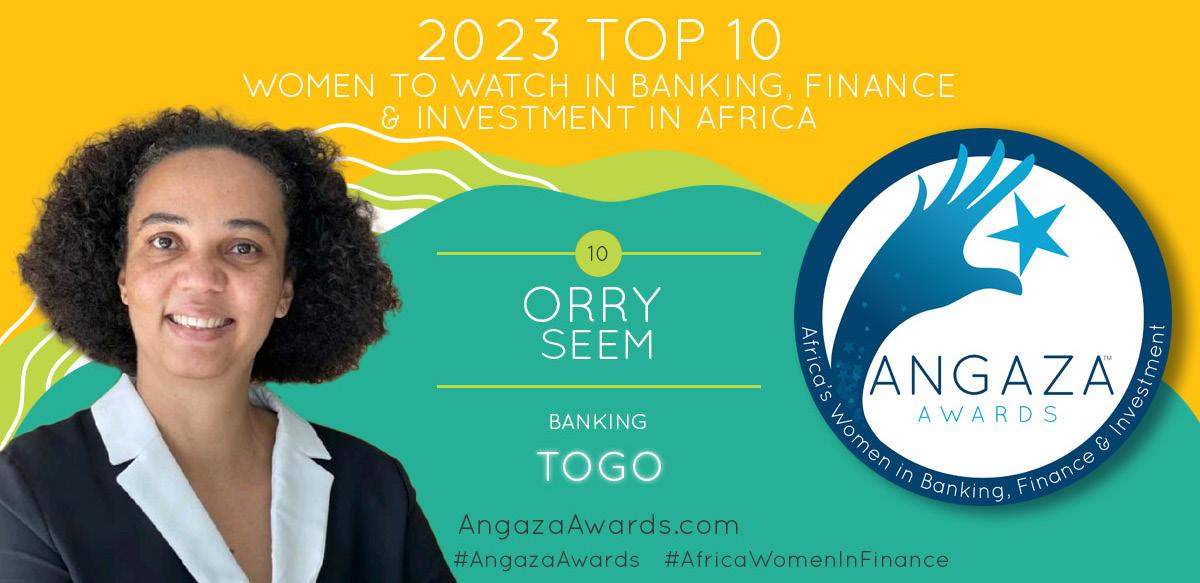
One of her greatest achievements is working on the single unified mobile banking app to serve 33 markets across Africa. Most of the Ecobank markets had unique market apps making the pan-African offering inefficient. Additionally, she actively works with key
partners on marketing campaigns to drive sales for different products (remittances, airtime, virtual cards) and services (payments via QR). This project brought about the most desired results for the brand, tripling the customer base. To date, Ecobank is the only bank that can offer unified mobile banking experience and one-of-a-kind products and services in several of its markets. The partnerships formed through her project, which reaches over 1 million transacting customers, have become critical in supporting a financial inclusion drive in the West Africa region as well as across the Continent in markets where Ecobank operates.
Meanwhile, she supports regulator engagements on product development and approval, roll out and monitoring for effective and efficient service delivery to clients.
Orry over the past five years has been involved in supporting young girls who have dropped out of school due to pregnancies and early marriages. The young ladies are supported through mentoring and coaching and in some cases legal or law enforcement support to get them back in school.

